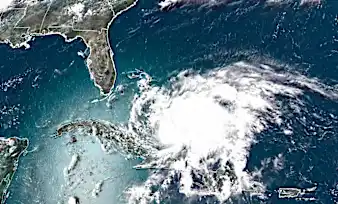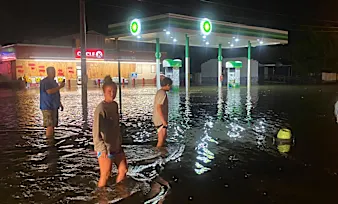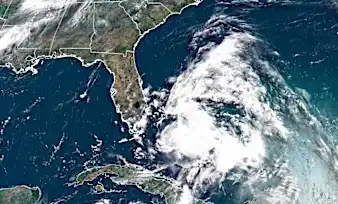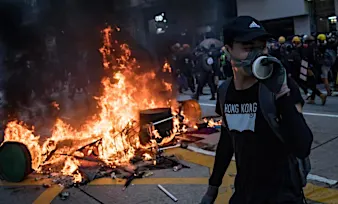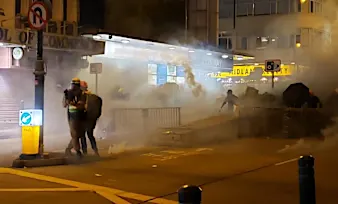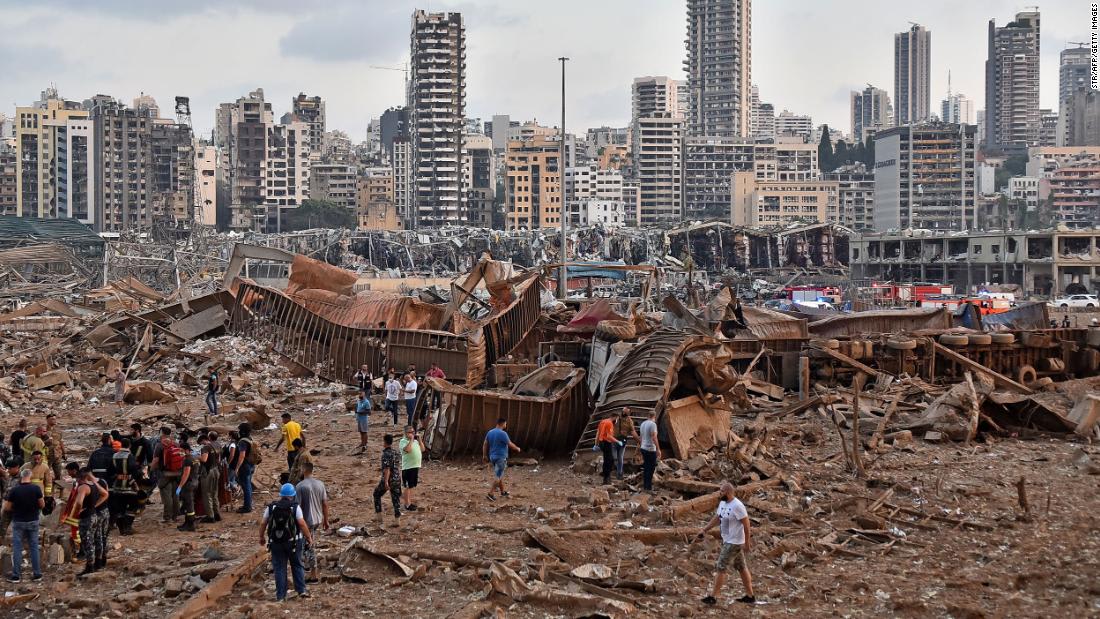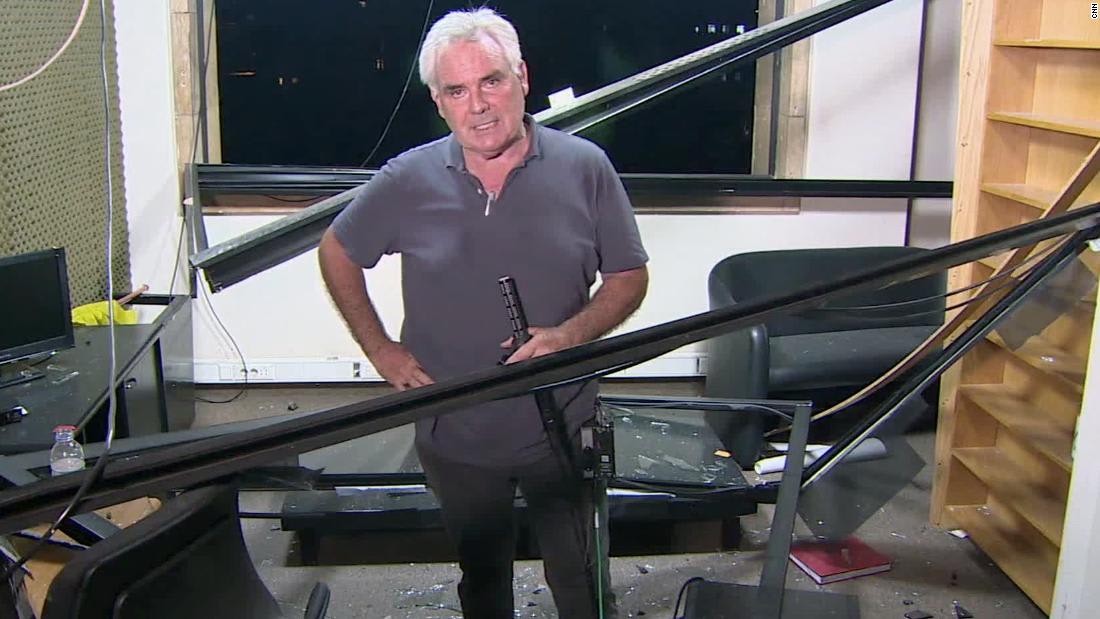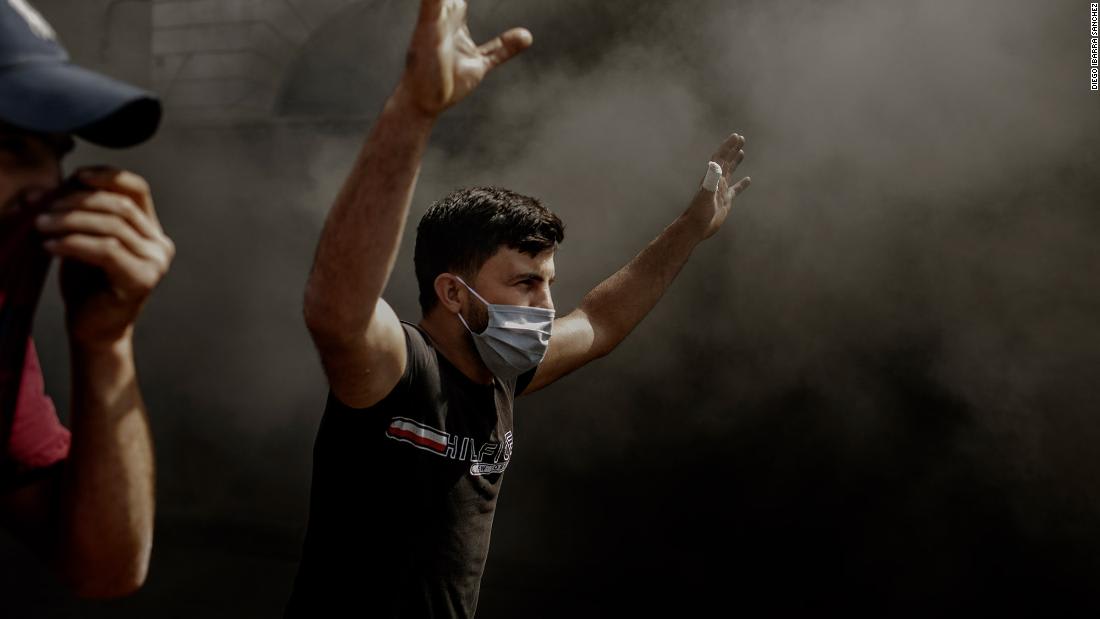Court documents warned repeatedly of the need to remove ammonium nitrate from Beirut port

Lebanese officials have been warning for years about the “extreme danger” of leaving ammonium nitrate in a container at Beirut port, according to court documents obtained by CNN through Lebanese human rights activist Wadih Al-Asmar.
The public documents show that the Director of Lebanese Customs, Badri Daher, requested the dangerous cargo be removed from the port in 2014, 2015, 2016 and 2017.
How the ammonium nitrate got to Beirut: Earlier CNN reporting revealed that a Russian-owned vessel was detained at Beirut port in the fall of 2013, carrying 2,750 metric tons (3,031 US tons) of ammonium nitrate. The crew later abandoned the ship and the cargo was moved to a warehouse at the port.
The ship was originally going to Mozambique, said Daher.
After the ship was detained, a Lebanese judge requested the dangerous cargo be “taken to an appropriate location for a guarded storage," the court documents show.
Despite this, the ammonium nitrate remained at the port for another six years.
Repeated warnings: Daher, and his predecessor, Chafic Merhi, then sent repeated letters to the legal authorities urging the cargo to be removed.
“Due to the extreme danger posed by these stored items in unsuitable climate conditions, we reiterate our request to the Port Authorities to re-export the goods immediately to maintain the safety of the port and those working in it," Merhi wrote in a 2016 letter.
The letters also reveal that the port attempted to sell the ammonium nitrate to the Lebanese Army and to the Lebanese Explosives Company, but to no avail.
Daher confirmed to CNN earlier on Wednesday that they had sent “a total of six letters to the legal authorities” but the legal officials never responded.
“The Port Authority should not have allowed the ship to offload the chemicals into the port,” Daher said.
Earlier on Wednesday, Director-General of Beirut Port Hassan Kraytem told local television channel OTV: "We stored the material in warehouse number 12 at Beirut port in accordance with a court order. We knew that they were dangerous materials, but not to that extent.”
Former Lebanese leaders call for an international investigation into Beirut blast
From CNN's Mohammed Tawfeeq, Ghazi Balkiz and Jomana Karadsheh
Former Lebanese officials on Wednesday called for the formation of an international investigation committee to investigate the blast in Beirut.
"Former Prime Ministers Najib Mikati, Fouad Siniora, Saad Hariri, and Tammam Salam find it necessary to ask the United Nations or the Arab League to form an international or Arab investigation committee composed of judges and investigators who are professional and impartial to start their duties in uncovering the circumstances and causes of the catastrophe that occurred in Lebanon," according to a joint statement released by Hariri's office.
The call was echoed by international aid and humanitarian organizations.
"Whatever may have caused the explosion, including the possibility of a large amount of ammonium nitrate stored unsafely, Amnesty International is calling for an international mechanism to be promptly set up to investigate how this happened," Amnesty International said in a statement.
Lebanon's President Michel Aoun stressed on Wednesday that the investigations would be transparent and will "hold those responsible accountable, and impose the harshest penalties on them."
Lebanese authorities declared Beirut a "disaster city" on Wednesday. They also declared a state of emergency in the city for two weeks.
Brazil will make "concrete gesture" to help Lebanon after blast, President Bolsonaro says
From CNN's Marcia Reverdosa in Sao Paulo
Brazilian President Jair Bolsonaro said he had called Lebanon's ambassador to Brazil, and offered to help the country following the explosion in Beirut on Tuesday evening.
"Brazil is going to do more than a gesture, something concrete to assist those people who are in a difficult situation because, in addition to being injured, many homes were also affected. So Brazil is in solidarity," Bolsonaro said at a ceremony at the Ministry of Mines and Energy on Wednesday.
"On behalf of the Brazilian government, of course, we express this feeling to the Lebanese people and we will be present in helping those people, we have a few million of them within our country."
Brazil is home to more than 8 million people of Lebanese descent. This is the largest community of Lebanese people outside of Lebanon, according to the Cultural Association Brazil-Lebanon.
Bolsonaro also told reporters that the government is in contact with a representative of the Lebanese community in São Paulo to decide what kind of aid will be sent, and that he could send the country an airplane.
Brazilian casualty: According to Bolsonaro, there have been no reports of serious injuries to Brazilians. However, he reiterated the Foreign Ministry's previous message that the defense attaché's wife in Lebanon had minor injuries and has been hospitalized since Tuesday, but is doing well.
The ministry also reported that the Brazilian embassy, located in the center of Beirut, was hit hard, but had no structural damage.
What we know about the blast in Beirut
From CNN's Jessie Yeung and Luke McGee
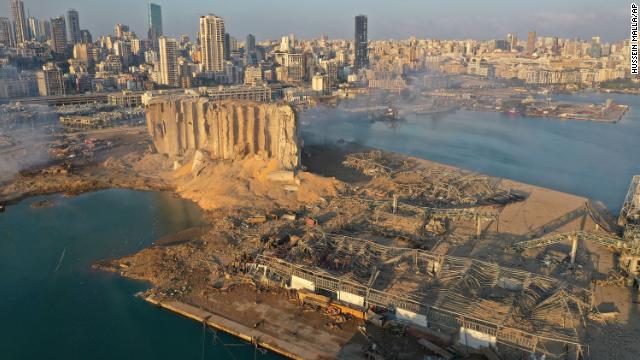
A massive explosion that rocked the Lebanese capital of Beirut on Tuesday left at least 135 people dead and thousands injured.
Authorities scrambled to treat the wounded, search for survivors, and assess the full extent of the damage on Wednesday.
Here's what we know about the blast so far:
- The explosion: It took place at 6:07 p.m. local time Tuesday near Beirut's port and central district, close to many highly-populated areas and tourist sites. The explosion tore through the city, flipping cars, shattering glass and causing some homes to crumble. Damaged buildings included the headquarters of former Prime Minister Saad Hariri and CNN's bureau in downtown Beirut. Homes as far as 10 kilometers (6 miles) away were damaged, according to witnesses.
- The victims: At least 135 people were killed in the blast and another 5,000 wounded, officials said, and the death toll was expected to rise. Among the dead are the secretary-general of the Kataeb political party, Nazar Najarian, according to NNA. He was in his office when the explosion happened and died after being critically injured. At least one Australian and one American were killed, according to officials from those countries. Two Filipino citizens also died from the explosion, and eight others were injured, said a statement from the Philippine Embassy in Beirut. Eleven other Filipino seafarers are still missing.
- The cause of the blast: There have been conflicting reports of what caused the blast. The explosion was initially blamed on a major fire at a warehouse for firecrackers near the port. But on Wednesday morning, Prime Minister Hassan Diab said that about 2,750 metric tons of ammonium nitrate, a highly explosive material, had been stored at a port warehouse over the past six years "without preventive measures."
- The aftermath: Lebanon has allocated 100 billion Lebanese pounds — which, according to the government rate, is about $66,335,000 — to deal with the effects of the blast, the Lebanese Presidency Twitter account said Wednesday. Aid groups like UNICEF and the Red Cross have teams on the ground assisting authorities, and have put out urgent open calls for blood donations.
- How to help: Several charities are on the ground providing medical care, shelter, supplies and other services to help the city recover and rebuild. You can help raise funds for supplies and assistance by visiting here.
4 Bangladeshi nationals killed in blast
From CNN’s Sugam Pokharel
Four Bangladeshi nationals were killed and nearly 100 others were injured in the explosion in Beirut on Tuesday, the country's state-run news agency Bangladesh Sangbad Sangstha (BSS) reported, citing senior officials at its embassy in Lebanon.
Among the injured were 21 members of the Bangladesh Navy, who were on duty at the port as part of the United Nations peacekeeping mission, BSS said, adding that one of the navy personnel is in critical condition.
Paris' Eiffel tower will go dark to honor Beirut victims
From CNN's Milena Veselinovic
France's Eiffel Tower will go dark at midnight local time tonight to honor the victims of the Beirut explosion, Paris Mayor Anne Hidalgo tweeted.
The city of Paris will provide an emergency aid of 100,000 euros — which is about $118,861 — to Beirut, Hidalgo said.
The Beirut explosion created a 405-foot-wide crater
From CNN's Daniel Wolfe
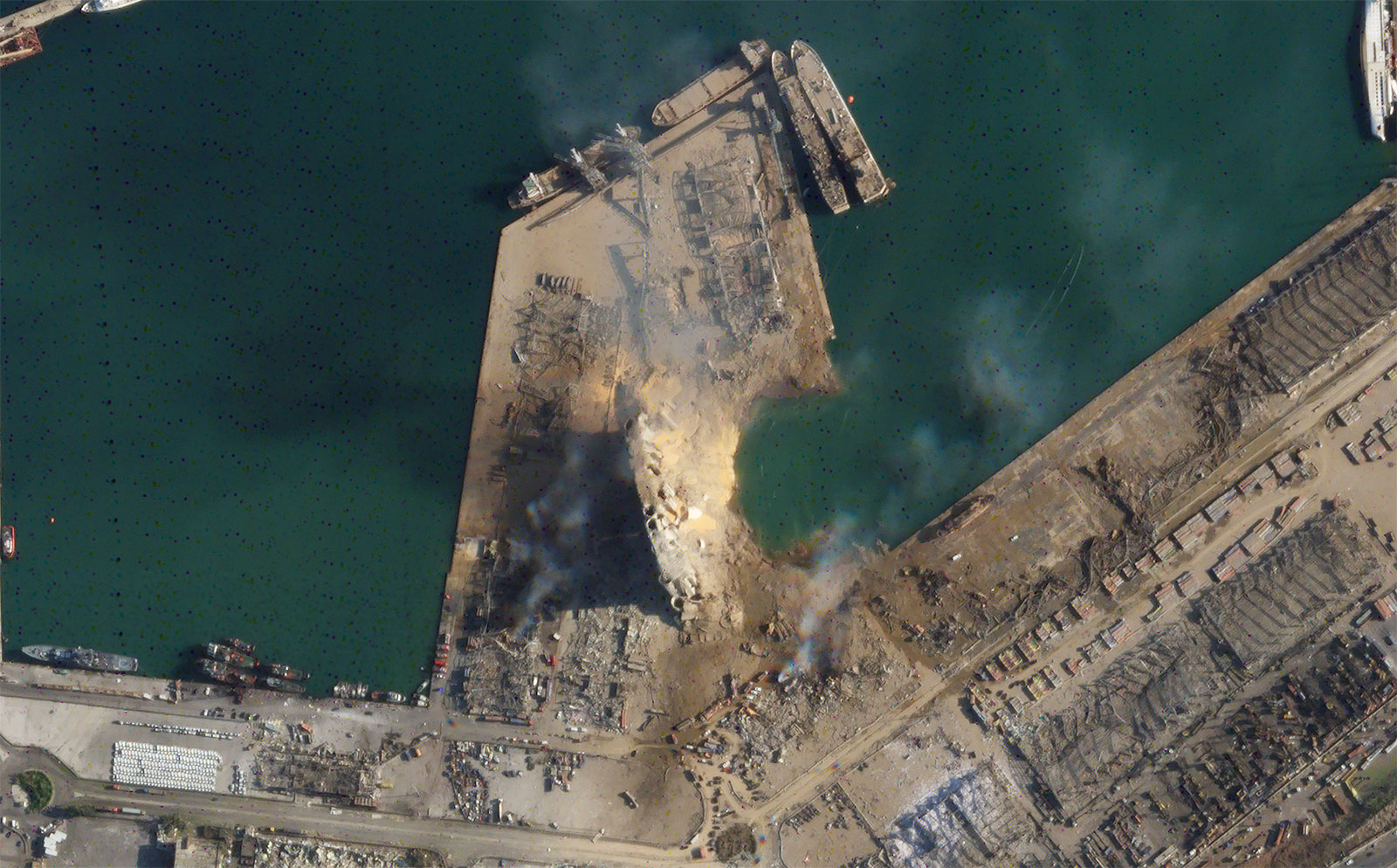
The diameter of the Beirut crater created by Tuesday's explosion appears to be roughly 124 meters — or about 405 feet, according to a CNN analysis of a Planet Labs, Inc. satellite image.
That distance means the crater is well over a football field in length.
CNN utilized geospatial software to measure the satellite imagery of the explosion site. The assessment is accurate within 10 meters.
US defense secretary on Beirut: "Most believe that it was an accident"
From CNN's Michael Conte

US Defense Secretary Mark Esper said the US is “still getting information on what happened” in regard to the explosion in Beirut, and that “most believe that it was an accident, as reported.”
US defense officials have told CNN there is no indication at the moment that the blast was an attack, despite President Trump calling it as such yesterday.
Esper’s remarks came as part of a discussion with the annual Aspen Security Forum, where he said he spoke about the blast with Secretary of State Mike Pompeo this morning.
“We’re reaching out to the Lebanese government, have reached out. We’re positioning ourselves to provide them whatever assistance we can, humanitarian aid, medical supplies, you name it, to assist the people of Lebanon,” he said.
At least 1 American killed and several injured in blast
From CNN's Jennifer Hansler
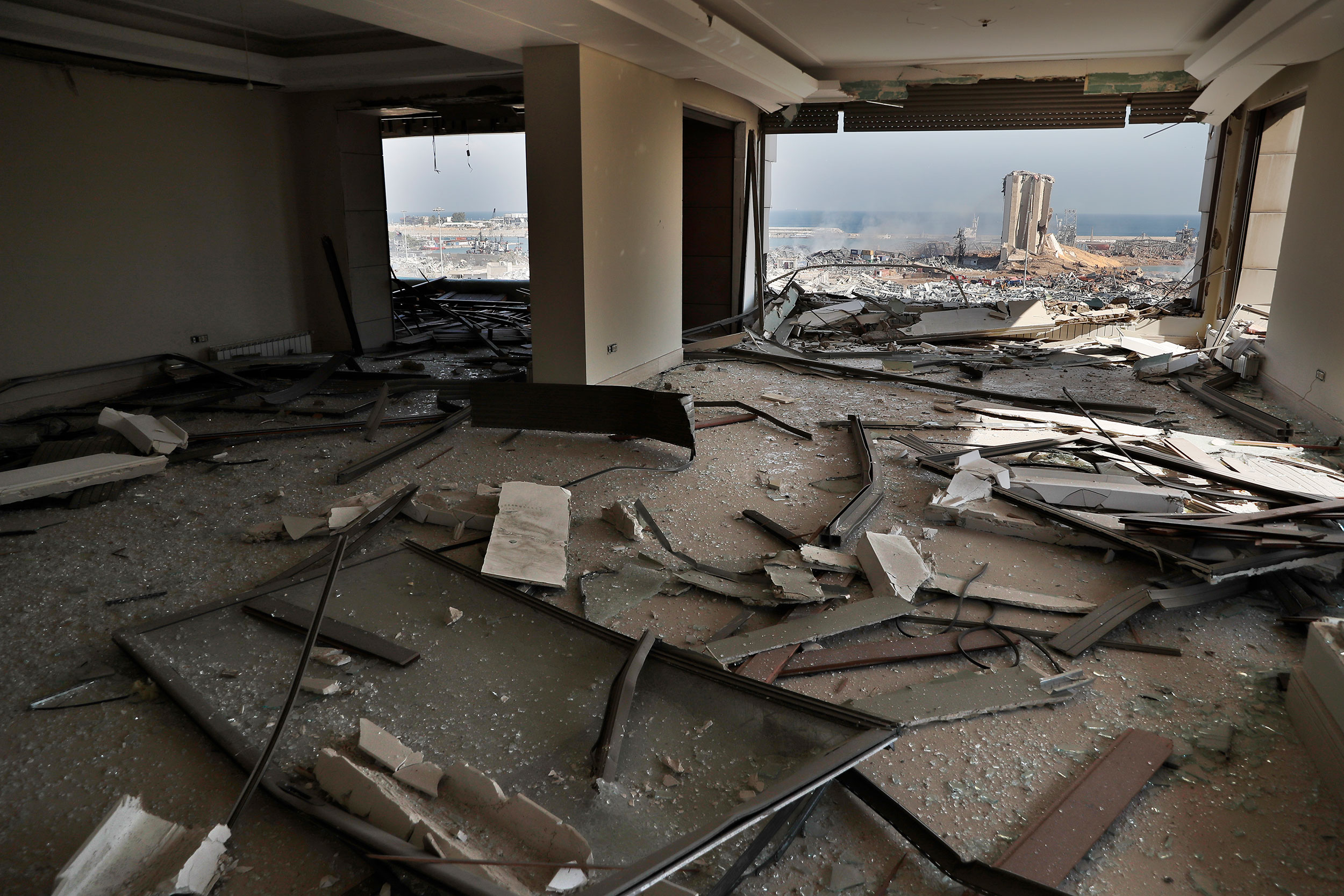
The US State Department is “aware of at least one US citizen killed, and several more injured, by the explosion” in Beirut, a spokesperson said Wednesday.
“All US Chief of Mission personnel in Beirut are safe and accounted for and US Embassy Beirut is open,” the spokesperson said.
“We offer our sincerest condolences to their loved ones and are working to provide the affected US citizens and their families all possible consular assistance,” the spokesperson said. “We are working closely with local authorities to determine if any additional US citizens were affected. Out of respect for the families at this difficult time, we have no further comment.”
The spokesperson said they are urging “US citizens in the affected areas who are safe to contact their loved ones directly and/or update their status on social media.”
“If you are in the affected area and need immediate emergency services, please contact local authorities. We urge US citizens to avoid the affected areas / shelter in place and follow the directions of local authorities,” they said.
This Beirut hospital may run out of medical supplies soon
From CNN's Aditi Sangal
Hospitals in Beirut are overwhelmed with casualties, with four of its hospitals out of service due to damage by the explosion. Even under this already high level of strain, Firass Abiad, CEO of Rafik Hariri University Hospital, says the situation will escalate and the death toll will climb further.
“I think that it's very likely that those numbers will increase. What we are hearing today from some of the EMS services that are sweeping buildings, that are in the vicinity of the blasts, is that they are finding bodies,” he said.
“I’m not sure we will see more survivors, but I think we'll definitely see more bodies coming in.”
The crisis comes to the city and its hospitals amid already existing challenges.
Rafik Hariri University Hospital was already running low on its medical supplies due to the financial crisis in Lebanon when Covid-19 hit, Abiad said. And in this backdrop of a surge in cases during a second wave, came the casualties from Tuesday’s explosion, completely overwhelming the hospital. Now, it’s about to run out of supplies.
“We are very close. I think, you know, when this happened yesterday, we threw everything that we had in our emergency room. We were trying to treat as much as we can. But with all honesty, if help does not arrive soon, we will be empty-handed very shortly,” he said.
The financial crisis, the coronavirus pandemic and the explosion has put his team “in the middle of a perfect storm,” he added.
“I'm a surgeon who worked through the civil war and we've seen financial hardships before. We've seen blast injuries before. We haven't seen corona before but I think that all of these together… we do not seem to see a light at the end of the tunnel.”
The way the staff at the hospital has reacted to the crisis has been “silver lining,” Abiad said.
“When this happened, part of my staff were finishing their shift and going home. And they just came back,” he said. “They were filled with empathy toward the patients and kindness. And I think the only hope I see with all of this is the ability of the human spirit to endure these hardships.”
Watch more:
UK to send aid, search and rescue experts to Lebanon, foreign secretary says
From CNN's Milena Veselinovic
UK will send 5 million GBP (approximately $6.6 million) in aid to Lebanon and will also provide medical and search and rescue experts to help in the aftermath of the Beirut blast, Britain's Foreign Secretary Dominic Raab told reporters on Wednesday.
Raab said he had spoken to the Lebanese Prime Minister Hassan Diab, and that a British Navy ship was "in the area" and ready to help.
How to help victims of the Beirut explosion
From CNN's Lauren Lee
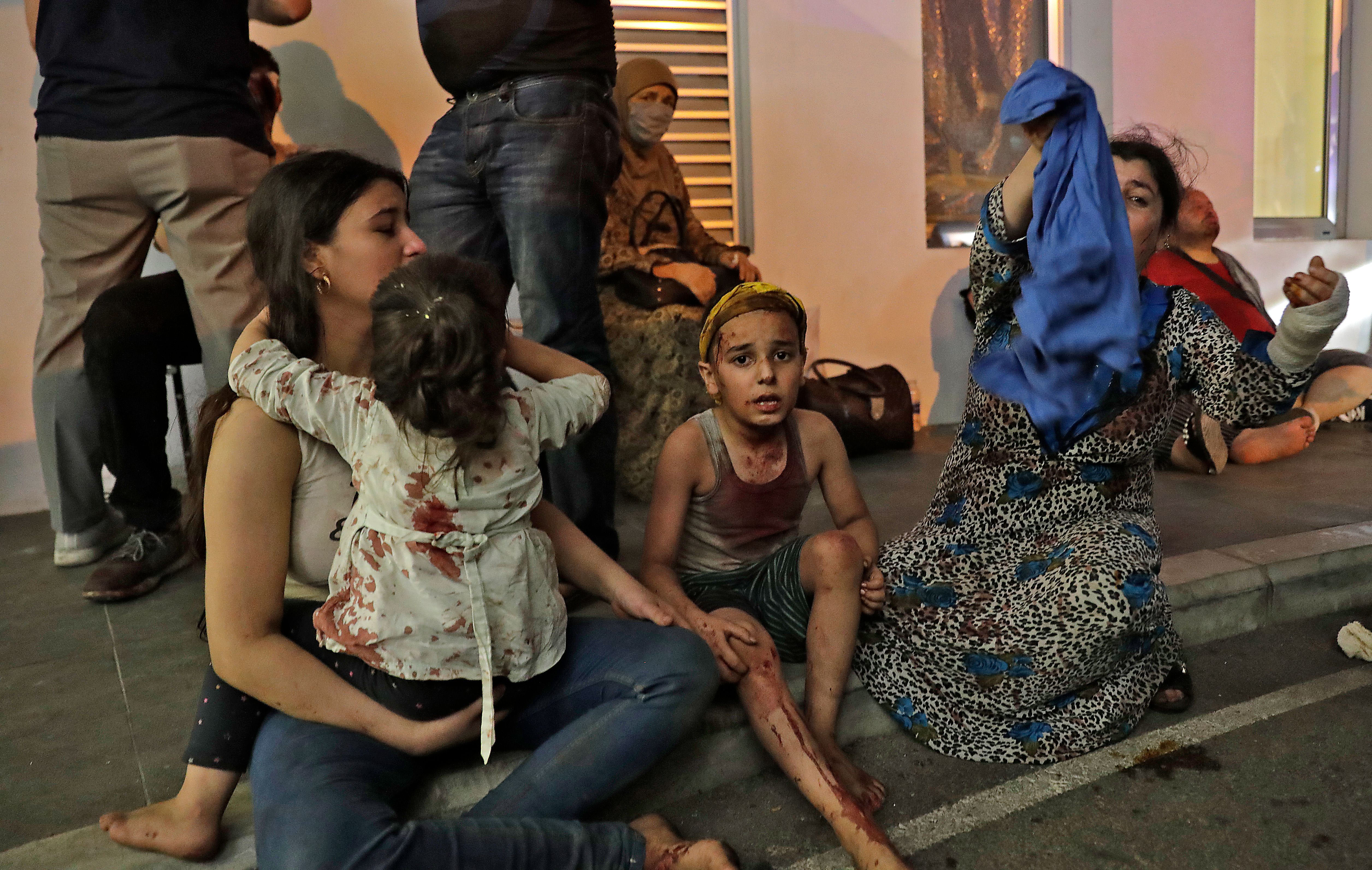
At least 100 people are dead and 4,000 wounded following an explosion in Lebanon's capital city of Beirut. While it is still unclear what caused the explosion, the city is decimated with thousands of residents left homeless, a medical system strained and up to $5 billion worth of damage.
You can help raise funds for supplies and assistance so desperately needed by clicking the button in this link.
Several charities are on the ground providing medical care, shelter, supplies and other desperately needed services to help the city recover and rebuild.
You can contribute by clicking here.
A televised mass showed the moment part of the church's ceiling fell because of the blast
From CNN's Aditi Sangal
A Catholic church in Beirut was televising its Tuesday mass as part of its Covid-19 safety protocols, but it was interrupted when the massive explosion went off.
Video of the service shows parts of the ceiling falling as a priest ran for cover, getting injured in the process.
Pope Francis has called on people to pray for Lebanon in the aftermath of Tuesday’s deadly explosion.
Watch the moment here from Al Hurra TV:
Death toll increases to 135, health minister says
From CNN’s Mohammed Tawfeeq and Mostafa Salem
The death toll for Tuesday’s blast increased to 135, Lebanon’s Health Minister Hamad Hassan told Al-Manar television.
Another 5,000 people are wounded and dozens more are still missing, he said.
“Unfortunately the number of martyrs is increasing,” Hassan told a reporter on Al-Manar television. “The wounded have reached 5,000 and they are receiving care inside the capital and outside the capital."
21 French citizens injured in the Beirut blast, Paris prosecutor's office says
From CNN's Barbara Wojazer in Paris
The office of the Paris prosecutor said in a statement on Wednesday that 21 French nationals were injured in the blast in Beirut.
This has prompted the Prosecutor's Office to open an "investigation for unintentional injury," the statement says, a standard procedure when French nationals are injured abroad, a source close to the investigation told CNN.
French President Emmanuel Macron will visit Beirut on Thursday to show “solidarity” with the Lebanese people in the aftermath of Tuesday’s disastrous explosion, according to the Twitter account of the Lebanese presidency.
A missing man's family says he could be trapped under the rubble of the blast site
From CNN's Aditi Sangal
Ghassan Hasrouty worked in the port in Beirut where the massive explosion took place. He went to work Tuesday morning, and that’s the last time his family saw him. Now, his daughter Tatiana Hasrouty said she is considering the possibility that he’s trapped under rubble.
“We don't know how he's feeling, if he's in pain, if he's asking for help. We don't know how he is," she said.
Hasrouty expressed her frustration with the government’s response to the disaster, saying the authorities are not searching the blast site.
“No authority is searching for them where they are,” Hasrouty says. “They say they don't have the capabilities, they don't have machines or construction machines to remove the rocks to find them. But we know for him and other workers of his, they are stuck there.”
“We don't really know what to do,” she added. "It's really frustrating and devastating.”
She said no authority has contacted the family.
“If it wasn’t for me, I posted the tweet on Twitter, nobody would know my father was there, and nobody would know my father is lost now," she said.
Watch Tatiana's plea:
Inside a home destroyed by the deadly explosion in Beirut
From CNN's Aditi Sangal
CNN's senior international correspondent Ben Wedeman went inside a home overlooking the port where Tuesday’s massive explosion took place in Beirut. The home was inhabited by an elderly couple.
“When the blast happened, the walls just collapsed,” wounding the woman who was in bed, Wedeman reports. She is severely wounded and in the hospital. “The bed is still stained with her blood.”
Looking out through the walls of the home that have collapsed, Wedeman describes the state of the warehouse that exploded. What was simply dry ground before, Wedeman says, is now a crater, with water flowing into the area.
The Lebanese government has committed to conducting a transparent investigation into the explosion, but Wedeman says it is “scant consolation” to the families of those killed, injured and missing.
Beirut's governor said in an interview earlier today that at least 300,000 people have been displaced from their homes by the blast.
Go inside the home damaged by the explosion:
Lebanon authorities declare Beirut a "disaster city" and impose state of emergency
From CNN's Mohammed Tawfeeq in Atlanta
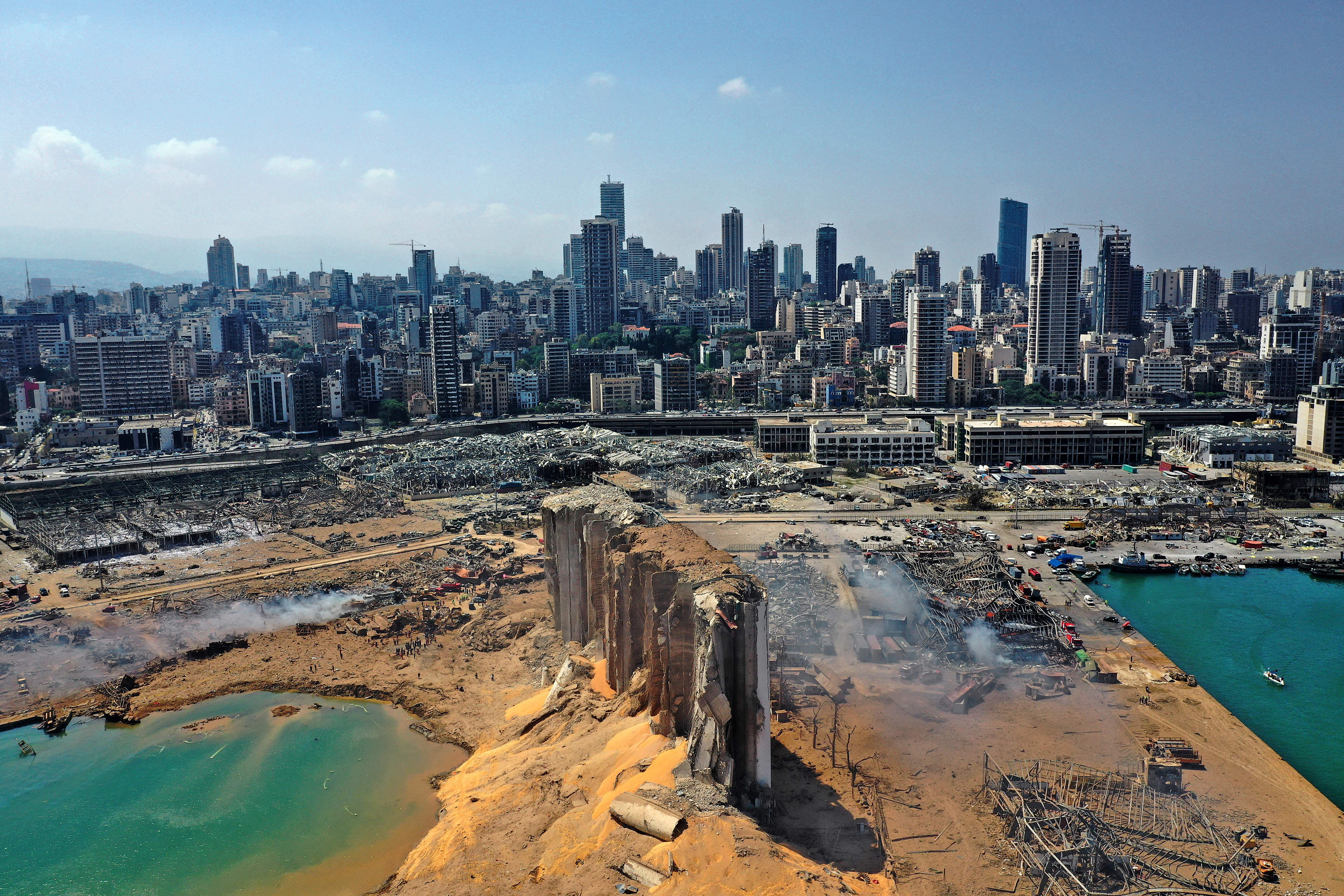
Lebanese authorities declared Beirut a “disaster city" on Wednesday, according to Lebanon State-run NNA news, citing a statement released by the country’s Minister of Information Manal Abdel Samad Najd.
A state of emergency has been declared in Beirut for two weeks, Najd said in the statement, adding this could be extended.
The country’s Council of Ministers made the two decisions on Wednesday in an “extraordinary session” headed by President Michel Aoun and in the presence of the prime minister.
"The highest military authority is immediately responsible for maintaining security," Najd said in the statement. "The government asked the Ministry of Works to take the necessary steps to secure import and export operations, especially in the ports of Tripoli and Sidon.”
It was also decided in the extraordinary session "to instruct the High Relief Commission to secure shelter for families whose homes are no longer fit for housing, open schools and hotels to receive citizens, and request from the security services to ensure Not to tamper with the crime scene," the statement said.
Nurse hailed as hero after pulling three newborns out of a hospital hit by Beirut blast
From CNN's Amy Woodyatt, Ghazal Salah, Dareen Al Omari, Mehsen Mekhtfe and Caroline Faraj
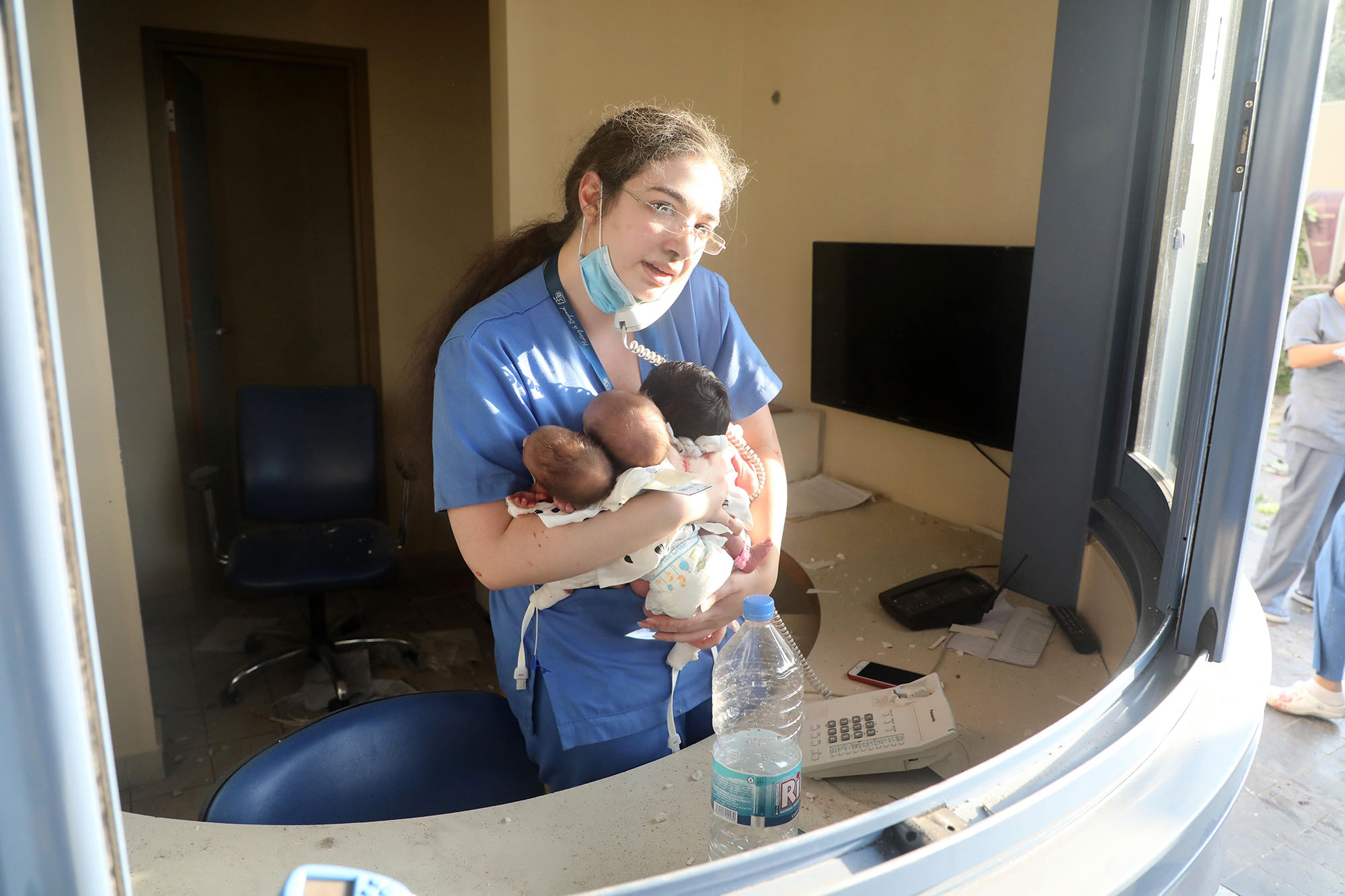
A nurse pulled three babies out of a hospital rocked by the massive explosion in Beirut on Tuesday, a photographer who took her picture told CNN Arabic.
Photojournalist Bilal Jawich said he was at home on the outskirts of Beirut when the blast, which has left at least 100 dead and thousands injured, rocked the Lebanese capital.
"I followed the smoke until I reached the port of Beirut," he said, explaining that "professional intuition" took him to Al Roum hospital, in the Ashrafieh district. The area has been left devastated by the blast.
What he saw was remarkable. "I was amazed when I saw the nurse holding three newborns," Jawich told CNN Arabic. "I noticed the nurse's calm, which contrasted with the surrounding atmosphere just one meter away." Several dead and injured people lay nearby, he said.
"However, the nurse looked like she possessed a hidden force that gave her self-control and the ability to save those children," Jawich said. "People stand out amidst these violent and dark and evil circumstances and this nurse was up to the task."
Jawich said the nurse told him later that evening that she was in the maternity ward when the blast hit. She said she had been knocked unconscious, and when she came around “found herself carrying these three children,” he told CNN Arabic.
Not everyone in the hospital was so lucky. George Saad, emergency preparedness and disaster manager for the hospital told CNN that some 12 patients, two visitors and four nurses died in yesterday's incident, while two remain in critical condition. Some 80% of the hospital had been damaged, along with 50% of its equipment, he said.
WATCH:
A drone captured the widespread destruction in Beirut
From CNN's Aditi Sangal
Drone footage captured by CNN this morning showed the destruction left in the wake of Tuesday’s deadly explosion in Beirut.
At least 100 people were killed in the blast, and the death toll could rise as many more people are reported missing. At least 4,000 people were injured in the explosion.
Watch the footage:
You might hear about ammonium nitrate today. Here's you need to know.
From CNN's Jessie Yeung
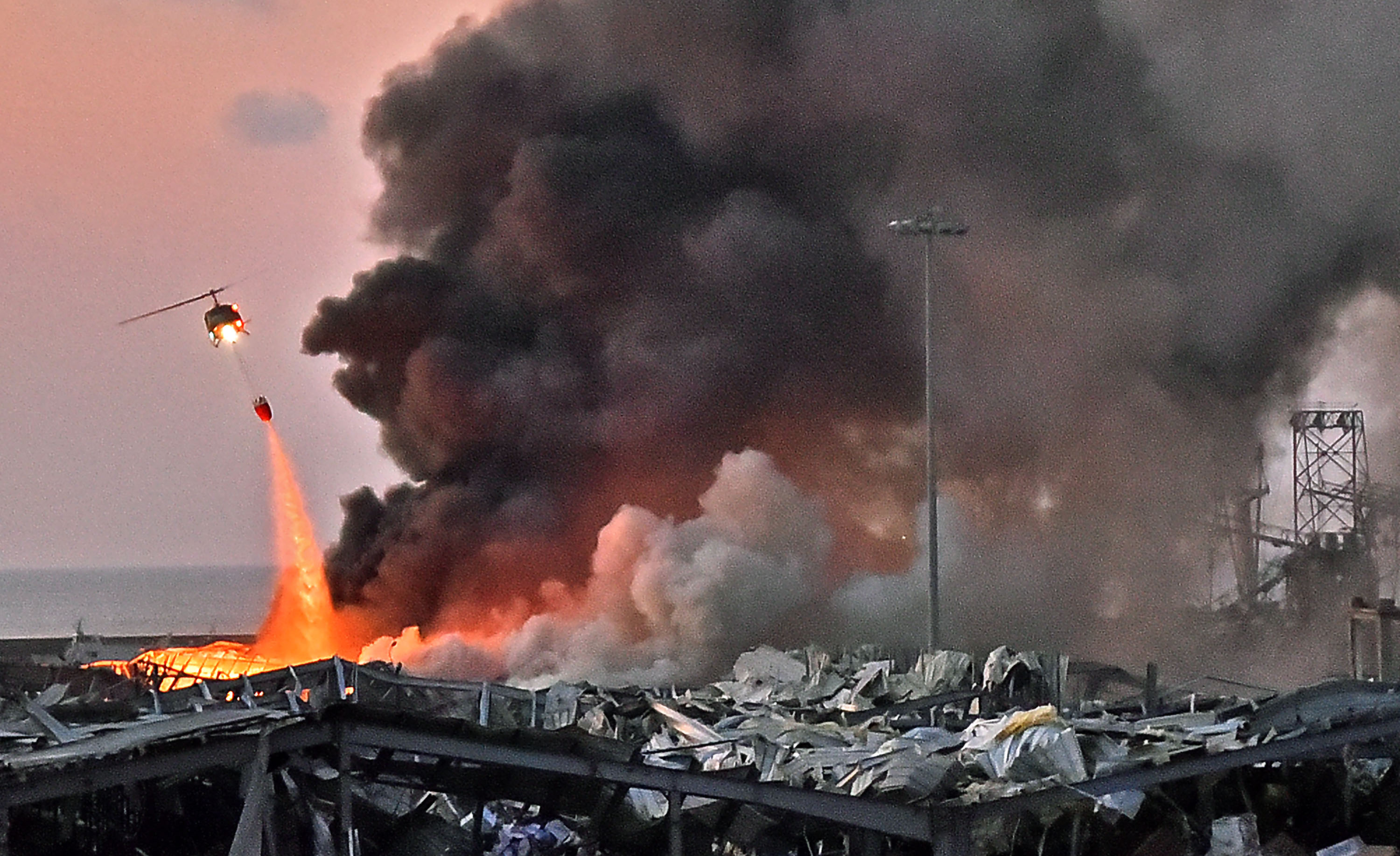
We're still not exactly sure what caused the deadly explosion in Beirut yesterday, but Lebanon's prime minister said an investigation would focus on an estimated 2,750 metric tons of the explosive ammonium nitrate stored at a warehouse.
So what is ammonium nitrate? Also known as AN, it's a compound of ammonia and nitrogen, is a highly volatile material used in agricultural fertilizers and bombs.
Disasters involving AN are rare, considering the US uses millions of tons of it every year in fertilizers, according to the Environmental Protection Agency. "Pure" solid AN is quite stable, but if the compound is mixed with any contaminants, even in small traces, the mixture becomes much more prone to detonation — which is why there are normally stringent government guidelines for how to treat and store it properly.
"In general, the conditions of AN storage are crucial to the safety and stability of the AN. Materials co-located or stored with AN may play a role in its sensitivity to explosion," the EPA said in a 2015 guide.
For instance, AN shouldn't be stored with any fuel, organic materials, chlorides or metals, said the guide — all potential contaminants. The EPA guidelines also recommend fire resistant walls in the storage unit, noncombustible flooring, and — crucially — controlled temperatures.
AN doesn't burn, but if exposed to heat, it can melt — which releases combustible toxic gases that can cause an explosion. It's even more dangerous if there is a large supply of AN all stored together, because once a small section of AN begins to melt and explode, the resulting heat can set off the rest of the supply.
Some history: One of the worst disasters in US history involving a form of ammonia occurred in April 1947 when a ship loaded with ammonium nitrate caught fire while docked in Texas City. The fire caused an explosion and additional fires that damaged more than 1,000 buildings and killed nearly 400 people, according to the website of the Texas Historical Association.
For perspective, that explosion was triggered by 2,300 US tons (about 2087 metric tons) of ammonium nitrate, according to US Homeland Security.
And the 1995 Oklahoma City Bombing, a US domestic terror attack that killed 169 people and injured 467, used only two US tons (1.8 metric tons) of ammonium nitrate.
Here's a satellite view of the scene, before and after the deadly blast
From CNN's Paul P. Murphy
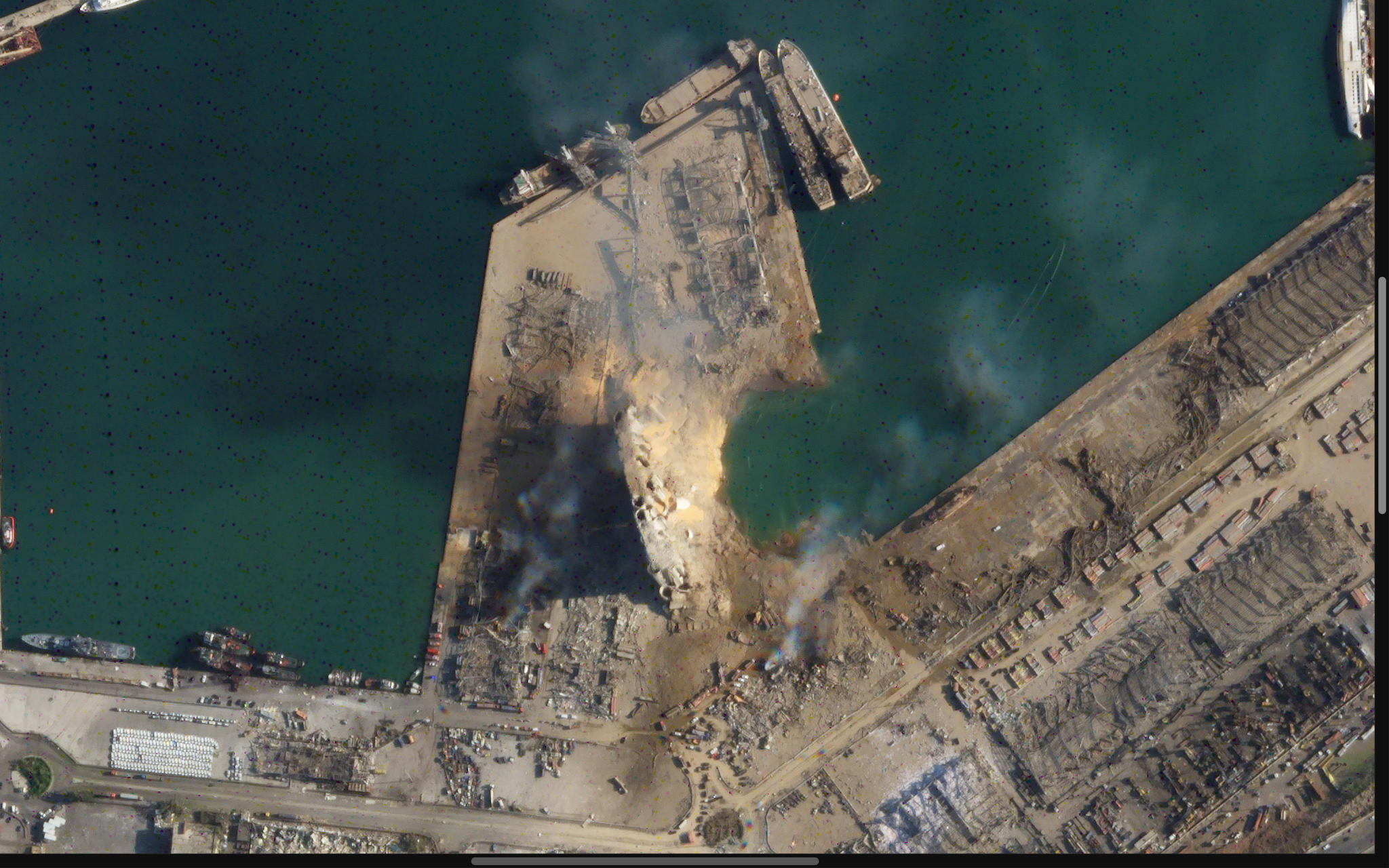
This satellite image from Planet Labs, Inc, showed the destruction left in the wake of yesterday's deadly explosion in Beirut.
At least 100 people were killed in the blast, and the death toll could rise as many more people are reported missing. At least 4,000 people were injured in the explosion.
For comparison, here's what the port area looked like before the blast:
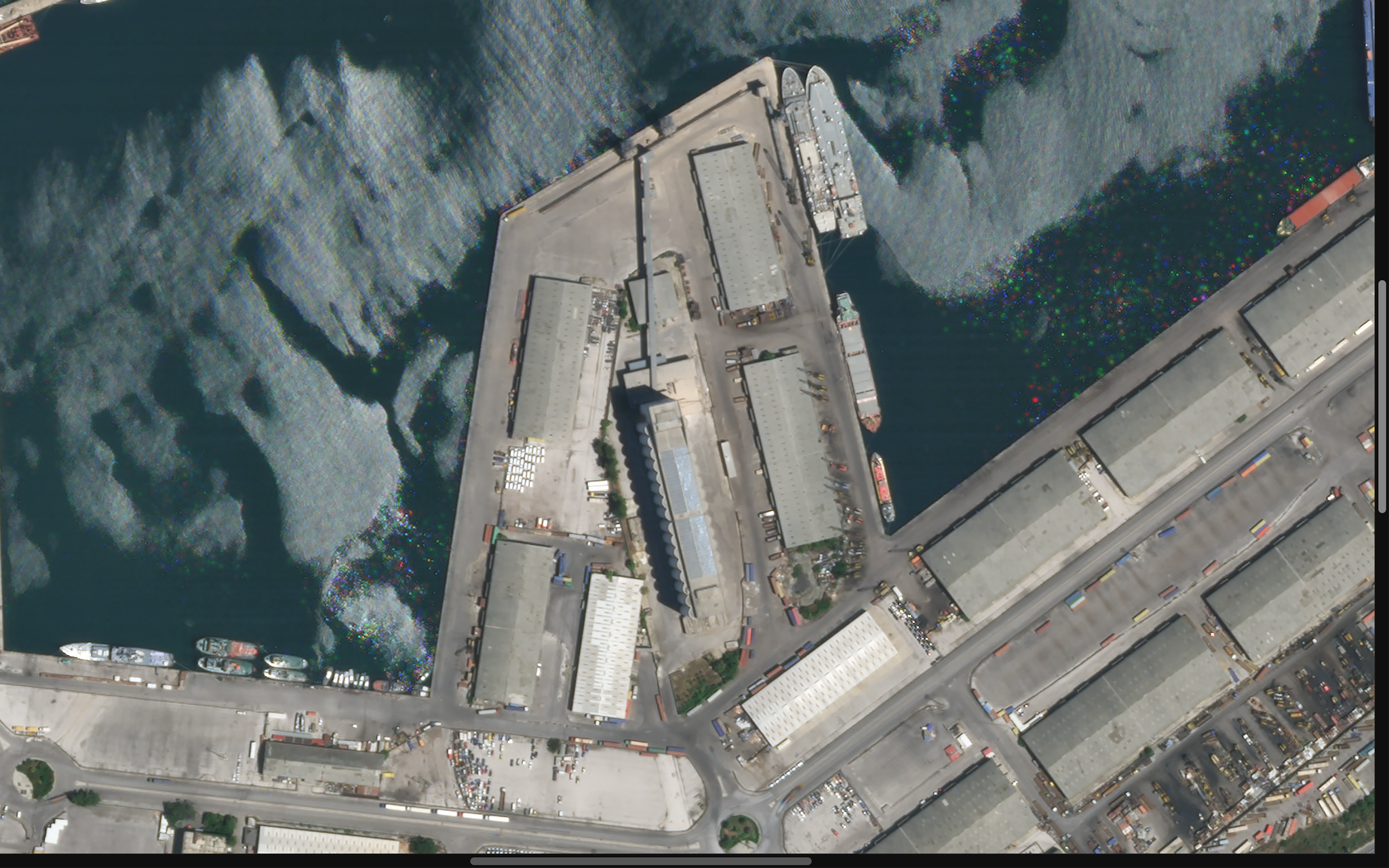
Beirut port officials to be placed under house arrest, minister says
From CNN’s Mostafa Salem
The Lebanese cabinet has ordered that “officials” involved in the Beirut port explosion be placed under house arrest “in the coming days,” the Lebanese Minister of Displaced People Ghada Shreim said without providing further details.
"There are officials who will stay in their homes in the coming days, pending the conclusion of the investigation and the results are issued. The house arrest will include those who took part in the storage, guarding and investigating of Hangar 12 from 2014 until today," Shreim told reporters at the end of today's cabinet meeting.
Every business in Beirut is impacted by the blast, economic official says
From CNN's Schams Elwazer
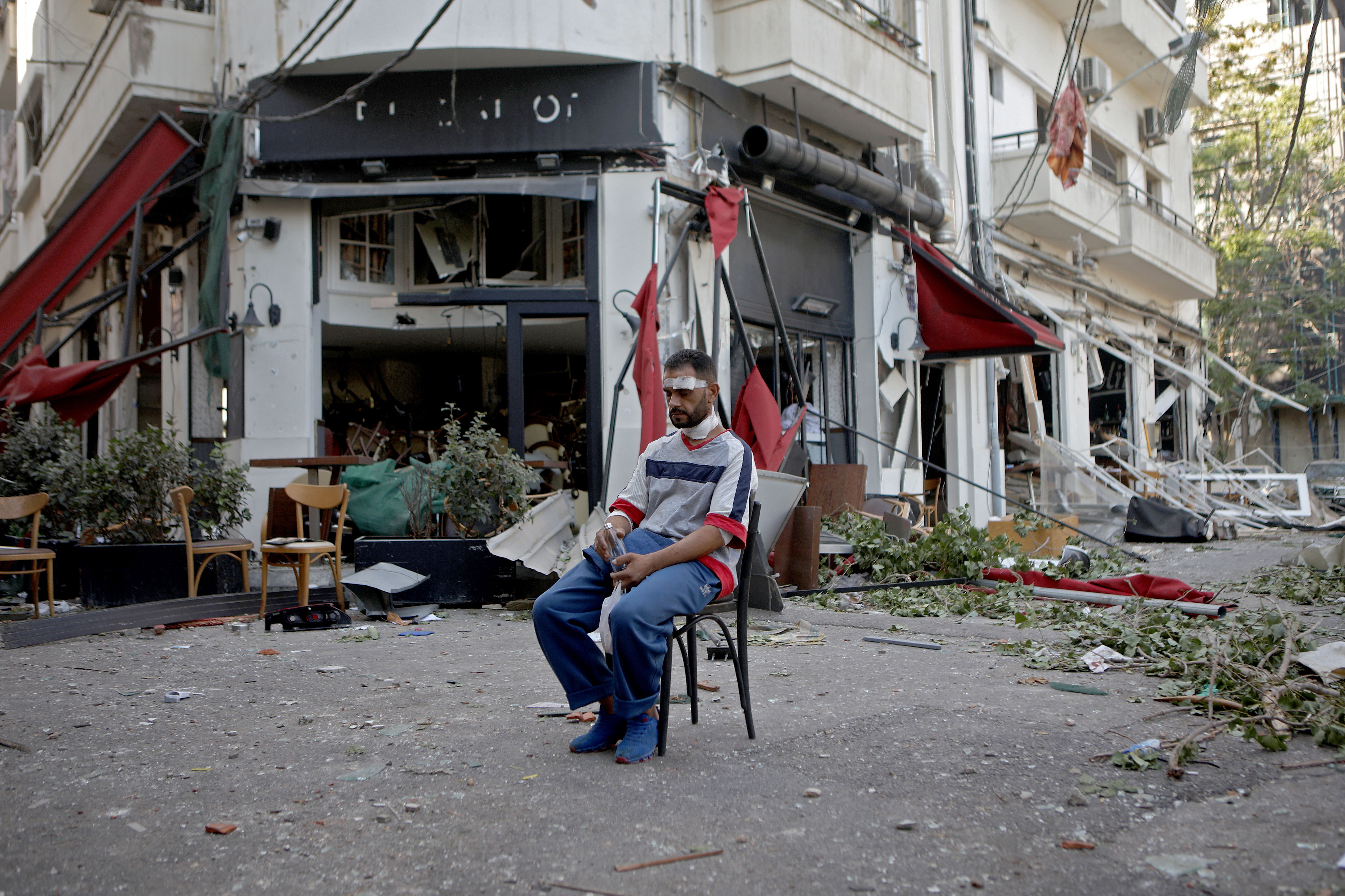
Every single business in Beirut has been affected by yesterday's deadly blast, Lebanon's Economy Minister Raoul Nehme said.
“There is not one apartment in Beirut that wasn’t impacted, not one businesses that wasn’t impacted – whether the storefront of the goods” he said.
”The impact on the economy is massive and the port has been practically erased,” Nehme told CNBC Arabia in an interview Wednesday, adding it was too soon to fully gauge the scale of the damage on the economy.
“No one can know the numbers right now. One billion [dollars], two billion, three, five, ten – we can’t know. It’s too soon. But it’s very high and more than our capacity,” he added.
He said the government’s priority was to secure people’s basic necessities – mainly food but also supplies to help repair the extensive damage to homes and infrastructure across the city.
Turkey sends rescue and health care teams to Beirut
From CNN's Gul Tuysuz
Turkey is sending search and rescue teams, health care workers, medical supplies and other urgent humanitarian aid to help in the aftermath of the blast in Beirut, according to the Turkish foreign ministry.
Turkey is also planning on setting up a field hospital, the ministry said in a written statement.
“We will continue to provide any and all help in solidarity and cooperation with our friendly and brotherly country Lebanon during these times of hardship which we hope they will overcome quickly,” the statement said.
Qatar sends medical supplies to Lebanon for explosion victims
From CNN's Jomana Karadsheh
Qatar sent a plane filled with medical supplies to Lebanon to help victims of the Beirut explosion, according to a tweet from the Qatari government.
The first plane arrived today, and the government will send three more carrying equipment for hospitals.
"Following directives by HH the Amir and in support of the Lebanese people, #Qatar has sent its first plane with medical supplies to help treat those injured by yesterday's explosion. This will be followed by 3 more aircraft, carrying equipment for two complete field hospitals," the government tweet read.
Lebanon’s health sector is suffering from two crises, Covid-19 and explosion aftermath, health minister says
From CNN’s Mohammed Tawfeeq
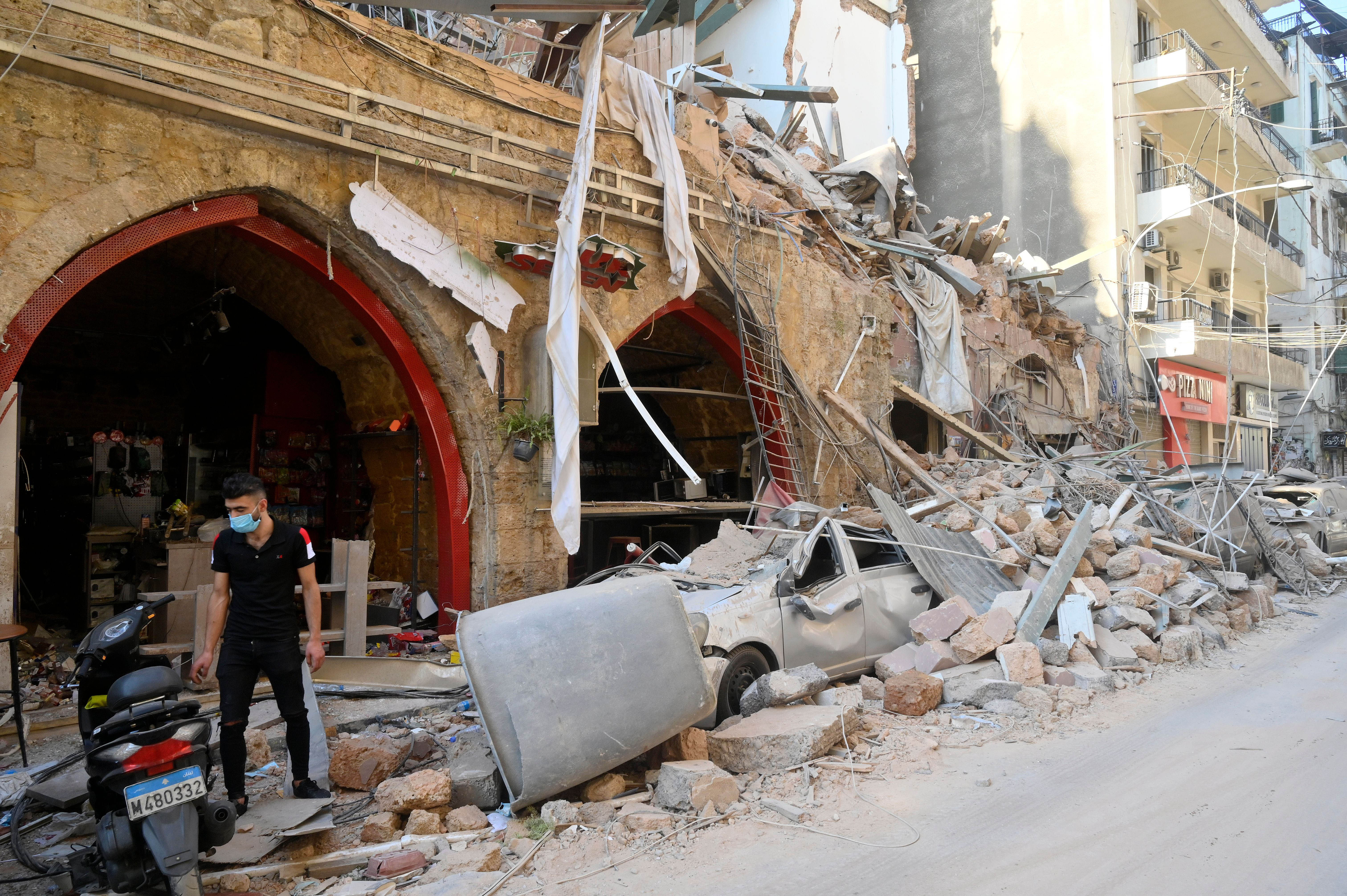
Lebanon's Health Minister Hamad Hassan said Tuesday’s explosion that killed at least 100 people and wounded 4,000 added to the country's health care system crisis as it has been already struggling with the Covid-19 pandemic.
"We in the health sector are suffering from a crisis in the face of the coronavirus, to which this human and health catastrophe has now been added," Hassan said according to Lebanon’s state-run NNA news.
"It requires everyone to engage positively from politicians, political parties, authorities, and from all friendly and brotherly countries because we suffer from a shortage in the number of beds and a lack of equipment to help injured people and those are in critical conditions," Hassan added.
Here's what we know so far about the Beirut blast
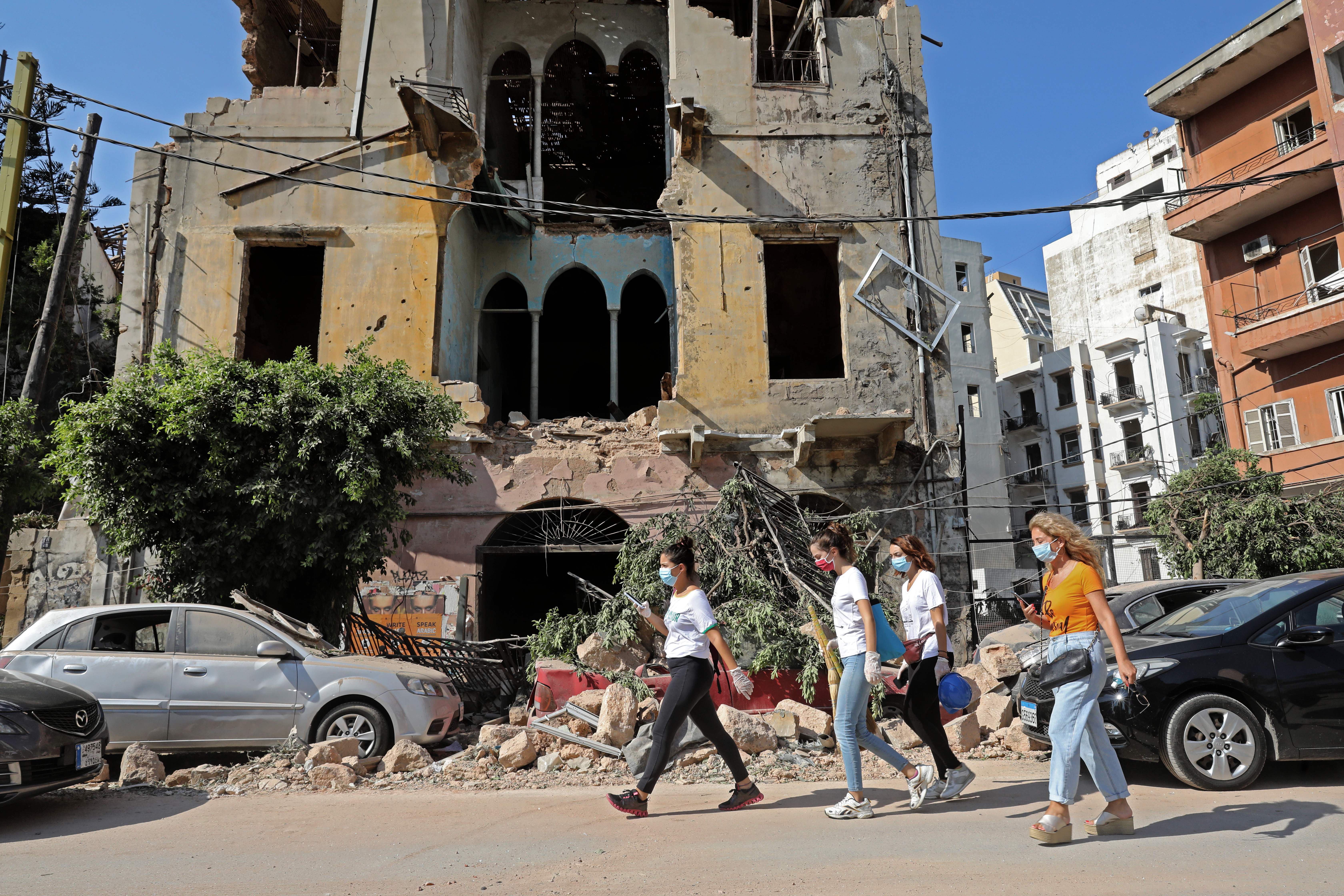
A deadly explosion shook Beirut yesterday. The Lebanon capital's 4 million residents woke this morning to the full horror and scale of the damage to their city, lives, and livelihoods.
If you're just reading in now, here's what we know so far about the massive blast:
- What happened: A massive explosion ripped through central Beirut, near the city's port. It sent up a huge mushroom cloud-shaped shockwave, flipped cars and damaged distant buildings. It was felt as far as Cyprus, hundreds of miles away, and registered as a 3.3 magnitude earthquake in the Lebanese capital.
- The victims: At least 100 people were killed and 4,000 wounded, state-run media reported, citing the Red Cross. And the death toll could rise today as hundreds more people have been reported missing.
- The possible source: We're still not exactly sure what caused the blast, but a warehouse storing thousands of tons of unsecured highly explosive material has emerged as a possible source. Lebanon's prime minister said an investigation would focus on the warehouse.
- The damage: Beirut's governor said it caused up to $5 billion in damage, but at this point, the full extent of the damage is yet to be known. Countries around the world have offered condolences and pledged aid for what the Lebanese Red Cross is calling an "unprecedented and very large" disaster.
Watch CNN's Ben Wedeman report:
At least 300,000 people displaced by explosion, Beirut governor says
From CNN's Schams Elwazer
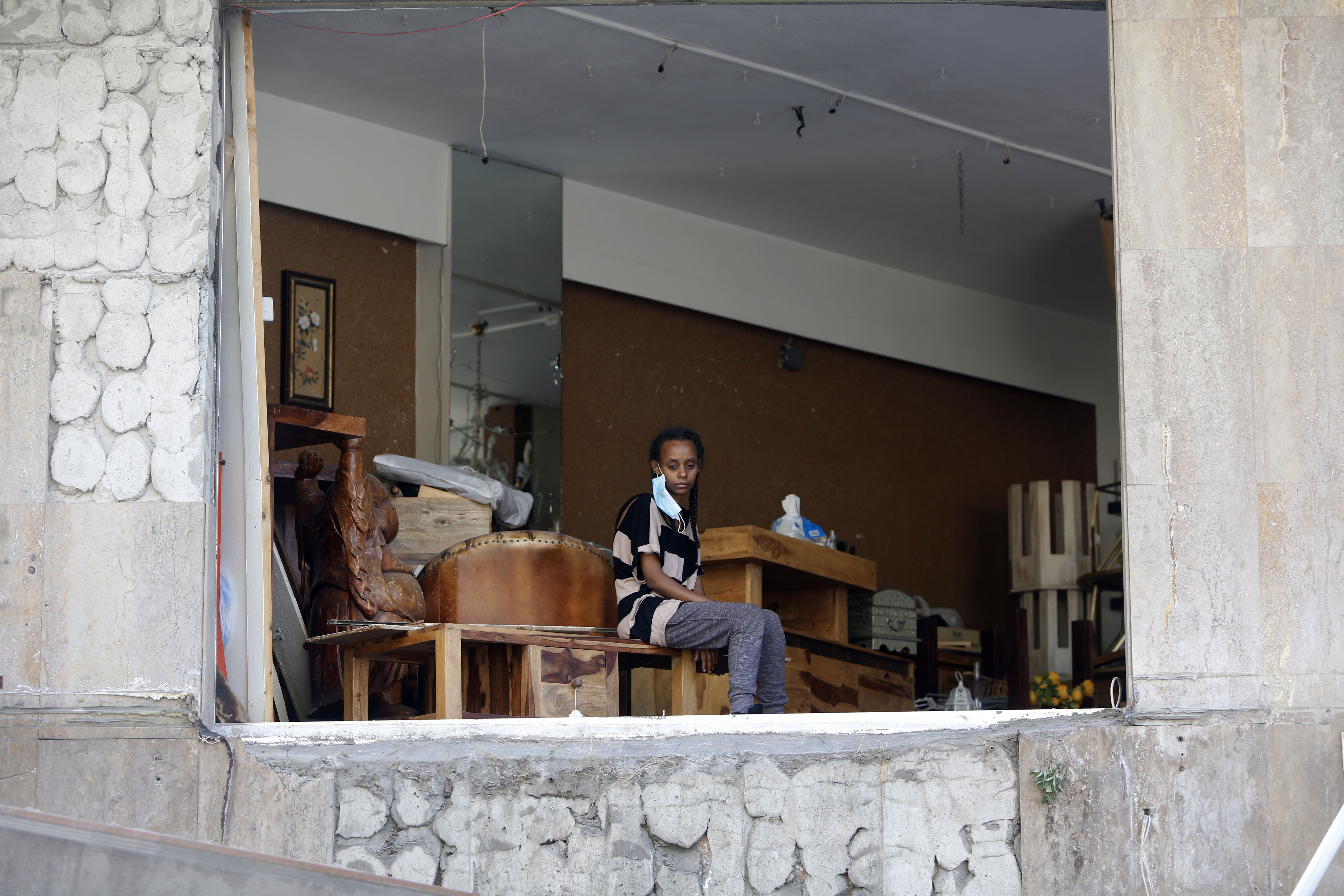
At least 300,000 people have been displaced from their homes by Tuesday's devastating explosion, Beirut's governor Marwan Abboud said in an interview with Jordan's state-owned channel Al Mamlaka.
"There are more than 300,000 Lebanese citizens unable to sleep in their own homes," Abboud said during the telephone interview. "Half of Beirut's population have homes that are unliveable for the foreseeable future — for the next two weeks."
Images and videos from the immediate aftermath of the blast show homes destroyed and covered with shattered glass.
At least 100 people were killed, and 4,000 more were wounded in the explosion, according to state media. That death toll is expected to rise as hundreds remain missing.
“We stand in solidarity with the people of Lebanon,” World Health Organization says
From CNN's Naomi Thomas
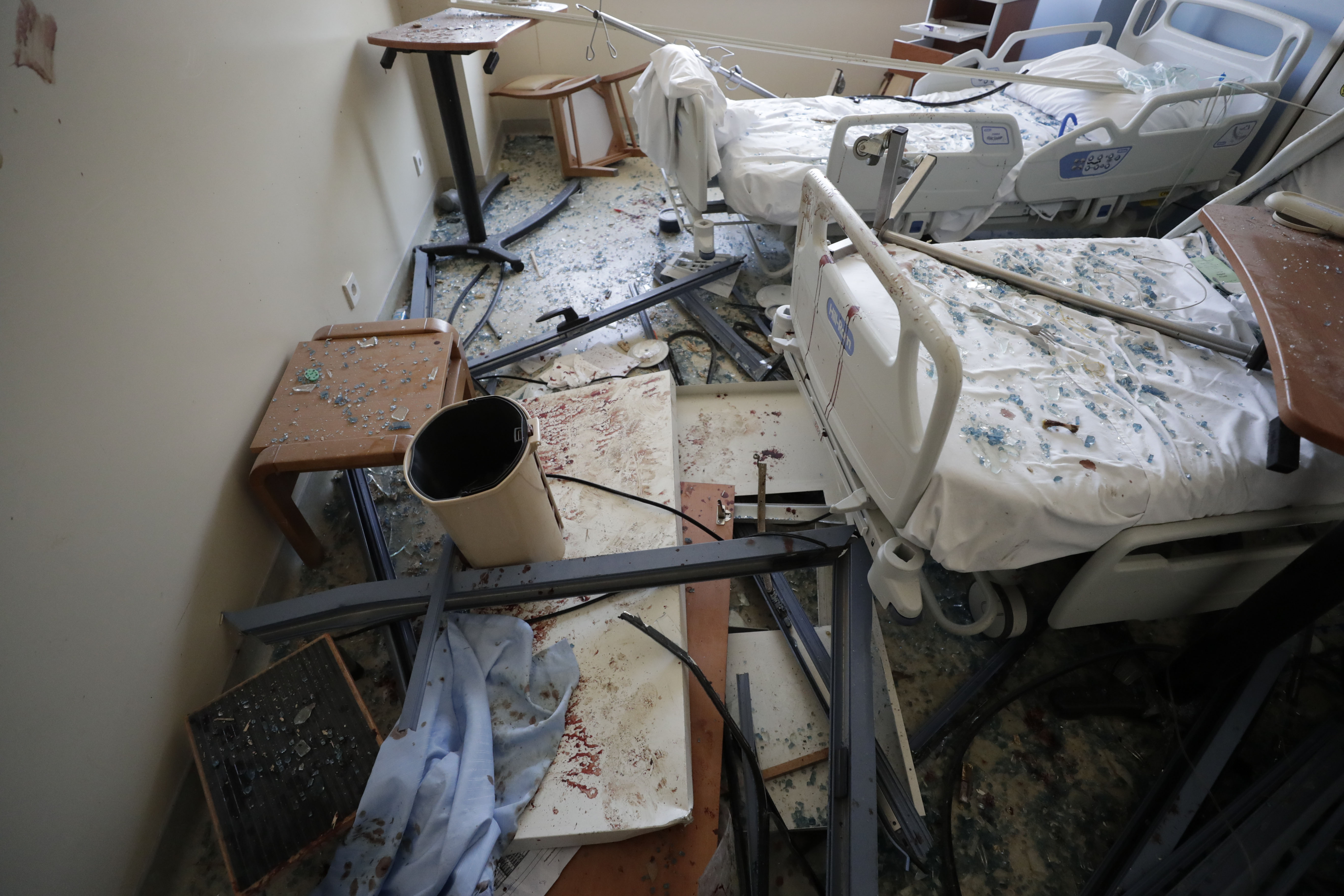
Dr. Mike Ryan, director of the World Health Organization (WHO) Health Emergencies Programme has said it is assisting with the crisis in Beirut and stands in solidarity with the Lebanese people.
Ryan was speaking during a question and answer session streamed live on WHO social media platforms Wednesday.
“It’s a really very shocking event,” Ryan said.
“Obviously damage assessments need to continue, as you’ve seen many, many hospitals overwhelmed with casualties, and people are still looking for the injured and the dead."
“It’s a very sad day. We stand in solidarity with the people of Lebanon, and we will do everything in our power, as WHO and the UN system, to support them.
“Our teams are on the ground. Our WHO country team is on the ground. We have logisticians there and others,” he added. “And we’ve already begun dispatching trauma and surgical kits from out regional warehouse in Dubai.
The UAE Royal Air Wing donated the cost of transporting the kits to Lebanon, Ryan said.
The WHO has also placed emergency medical teams on standby, to be deployed if requested by the Lebanese government.
Lebanese customs head says he sent six memos warning of dangerous substances stored at Beirut’s port
From CNN's Nada AlTaher
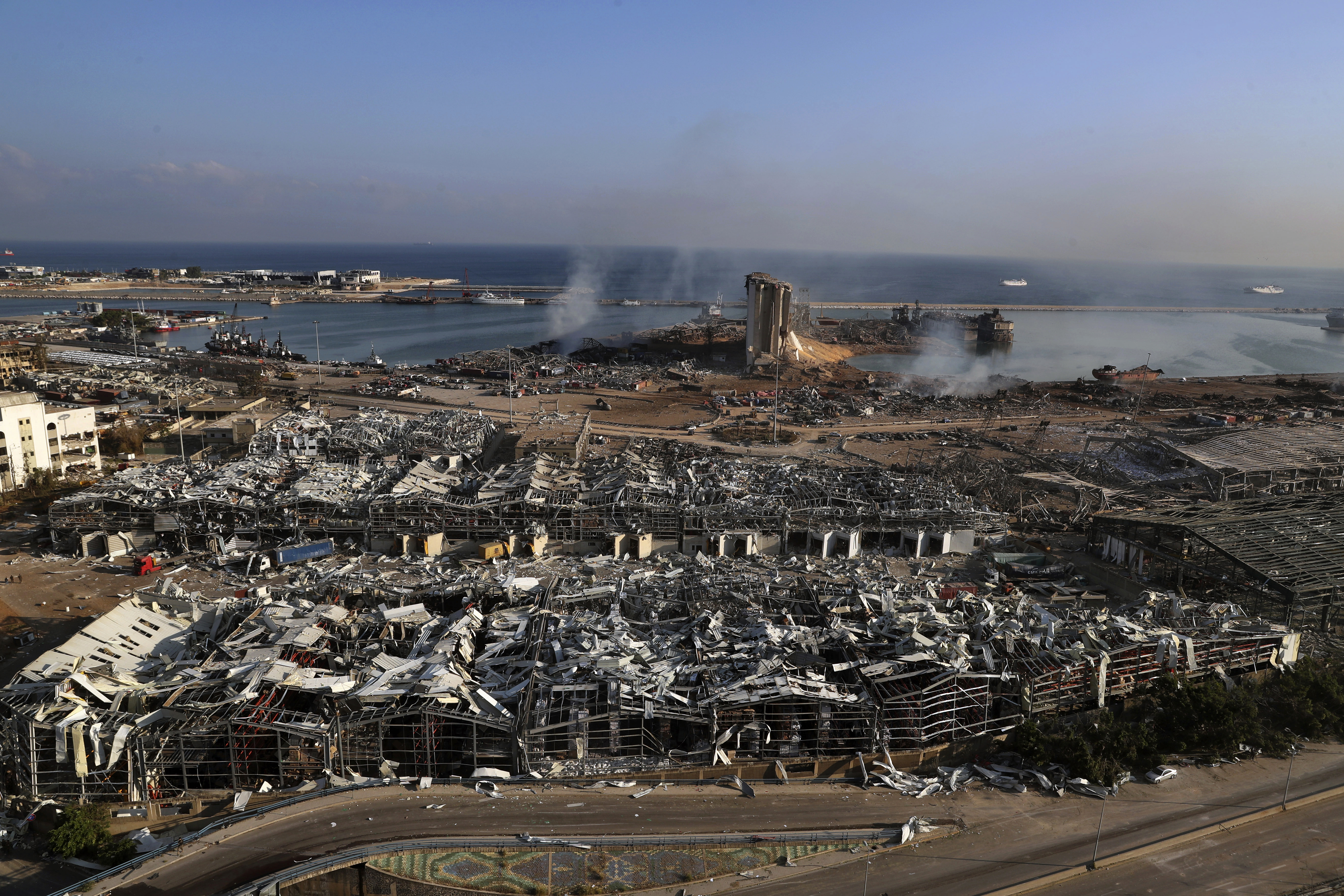
The head of Lebanon's Customs Authority Badri Daher has said he repeatedly warned the country's judiciary about dangerous substances stored at Beirut's port.
Daher said he sent six memos to judiciary officials warning that the substances posed a danger to the public, according to Lebanon’s LBC channel.
“Daher revealed that he asked to re-export these materials, but this matter did not happen," LBC reported.
LBC did not report the dates on which the memos were sent.
The explosion is thought to have been caused by 2,750 tonnes of ammonium nitrate stored for six years without safety measures at the port, according to Lebanese President Michel Aoun.
Aoun has promised a transparent investigation into the causes of Tuesday’s explosion and vowed that those responsible will be held accountable and punished, amid mounting public anger over Tuesday's disaster.
UN Secretary General offers condolences to families of victims
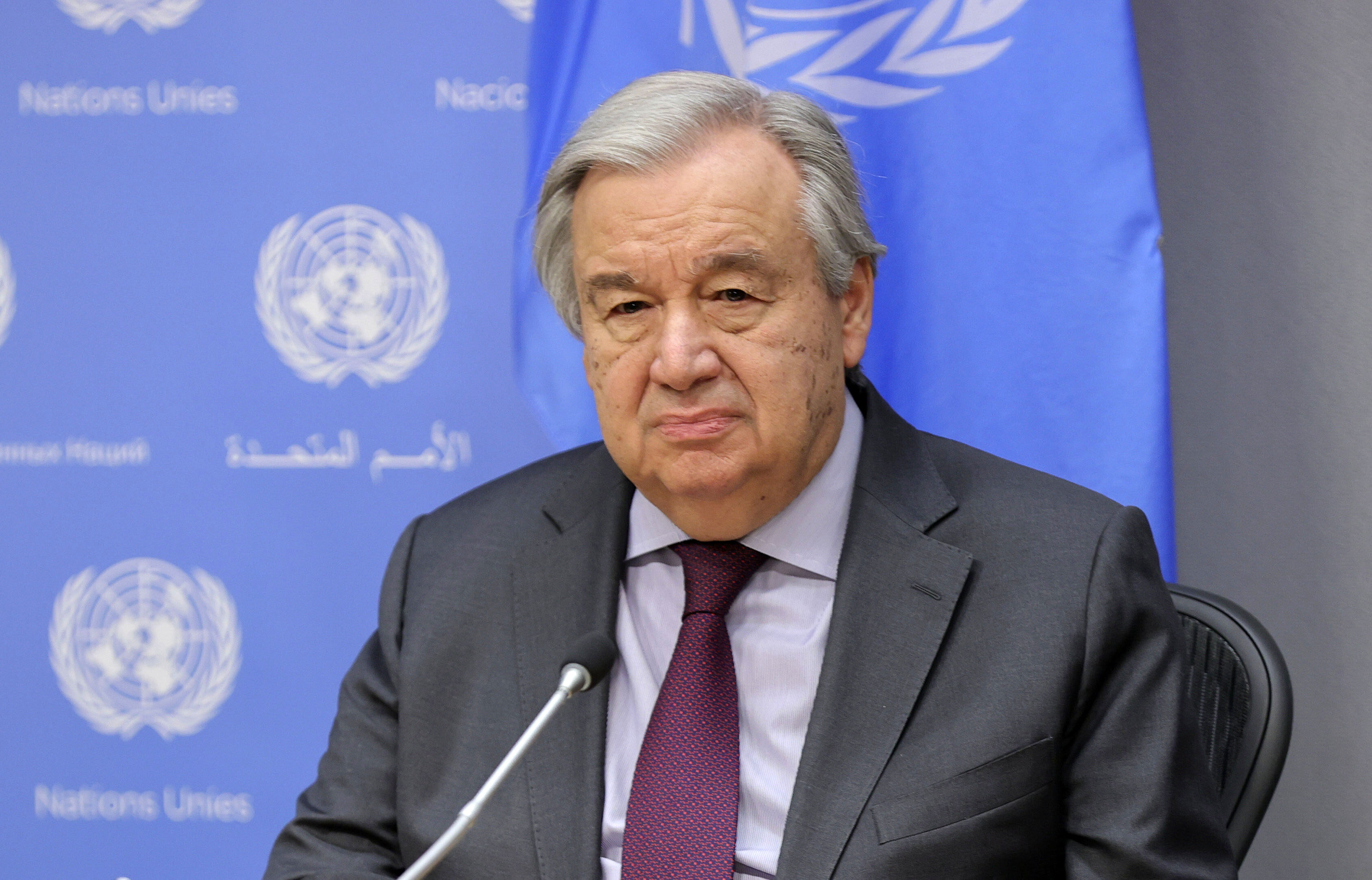
United Nations (UN) Secretary General Antonio Guterres has offered his "deepest condolences" to those affected by the explosion in Beirut.
"I wish all injured, including United Nations personnel, a speedy recovery," he said on Twitter Wednesday.
"The [UN] remains committed to supporting Lebanon at this difficult time."
The UN High Commissioner for Refugees Filippo Grandi also said the agency stood "in solidarity with people of Beirut and Lebanon in these tragic and testing times," in a statement released Wednesday.
France's Emmanuel Macron will visit Beirut on Thursday
From CNN's Schams Elwazer

French President Emmanuel Macron will visit Beirut on Thursday, to show “solidarity” with the Lebanese people in the aftermath of the disastrous explosion, according to the Lebanese Presidency's official Twitter account.
The Elysée Palace said earlier on Wednesday that France was sending equipment and personnel to Lebanon as part of an emergency assistance package.
90% of Beirut hotels damaged, state media says
From CNN's Nada AlThaher
The explosion at Beirut's port Tuesday damaged 90% of the hotels in the Lebanese capital, state news agency NNA reported Wednesday, citing Pierre Achkar president of Lebanon's Hotel Federation for Tourism. The port area was severely damaged by the blast.
Beirut has attracted increasing numbers of tourists in recent years, with Lebanon drawing two million visitors in 2018.
European Union pledges aid and support for Lebanon
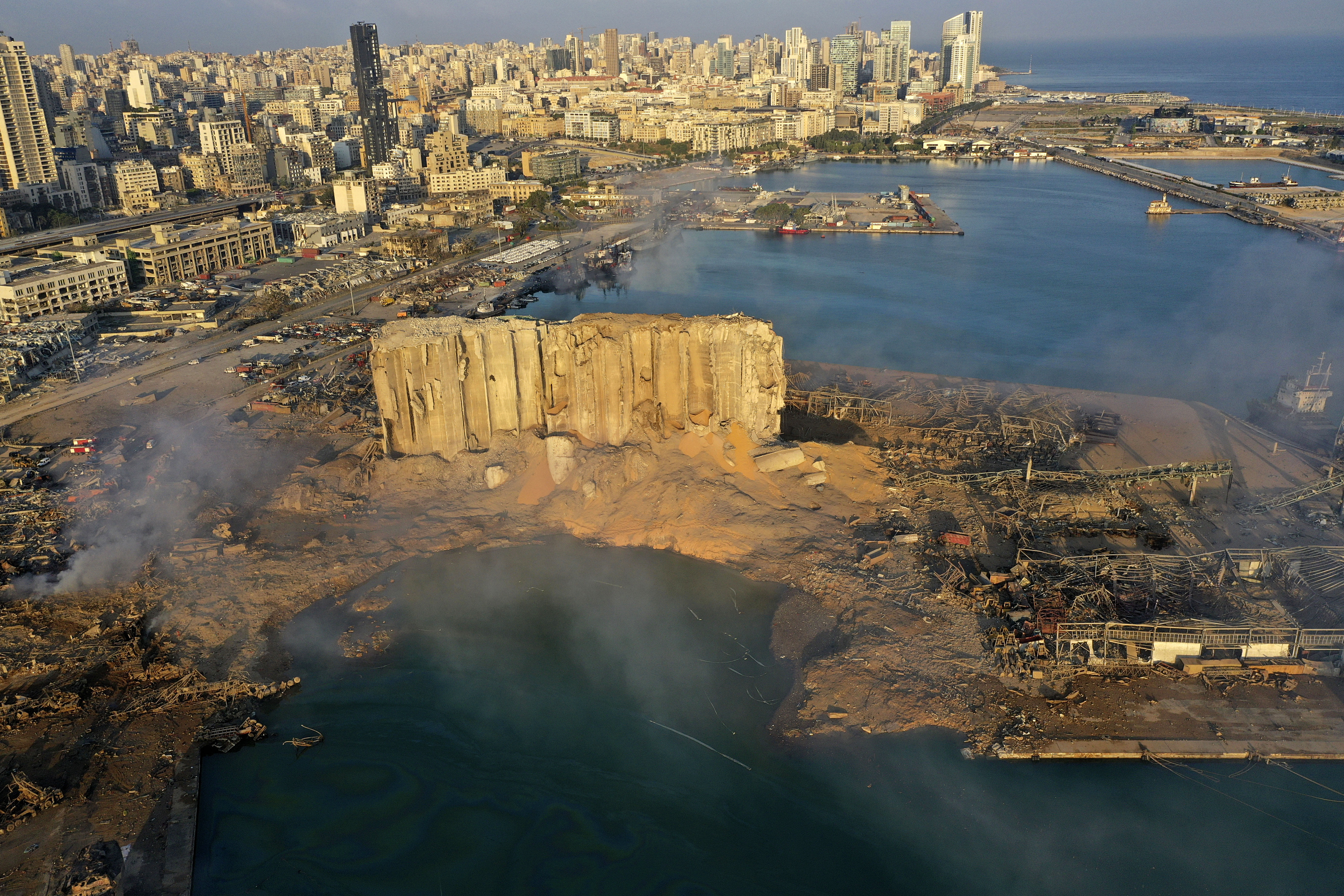
The EU has offered its full support to Lebanon and activated its Civil Protection Mechanism (CPM) in response to the crisis. The CPM is a tool which helps the bloc co-ordinate aid from its member states.
EU officials will urgently deploy "over 100 highly trained firefighters, with vehicles, dogs and equipment, specialised in search and rescue in urban contexts," EU Commissioner for Crisis Management Janez Lenarčič said in a statement from published Wednesday.
The Netherlands, Greece and the Czech Republic will participate in the scheme and France, Poland and Germany have also offered to assist Lebanon.
"The EU has also activated its Copernicus Satellite mapping system to support the Lebanese authorities in assessing the extent of the damage," Lenarčič added.
"We stand with Lebanon and its people and are ready to mobilise further help."
France will send military planes and equipment to Lebanon
From CNN's Pierre Bairin in Paris
France will send two military planes and 15 tons of equipment to Lebanon, as the international effort to assist the country intensifies.
The aid package includes two military planes, 55 personnel, 15 tons of equipment and a mobile clinic able to care for 500 wounded people, according to a statement from the Elysée Palace Wednesday.
The personnel and equipment is scheduled to arrive on Thursday afternoon.
In addition, 10 emergency health professionals will try to reach Beirut as soon as possible to assist the hospitals in the Lebanese capital.
The Elysée Palace said French members of the United Nations Interim Force in Lebanon (UNIFIL) had already stepped in to assist with the crisis on Tuesday evening.
France joins Qatar, Kuwait and Iraq, which have al pledged to send field hospitals to the Lebanese capital.
Six Turkish citizens among thousands wounded
From CNN's Gul Tuysuz
Six Turkish citizens were among the thousands wounded in Tuesday's explosion, Turkey's Foreign Minister Mevlut Cavusoglu said in a tweet posted Wednesday.
“Five are lightly wounded, and the one who has undergone an operation is getting better. We are in touch with the families," Cavusoglu said.
Earlier, the Philippines Embassy in Beirut confirmed that two of its citizens died in the disaster, while eight more sustained injuries.
Hundreds reported missing by family members, Health Minister says
From CNN's Charbel Mallo in Abu Dhabi
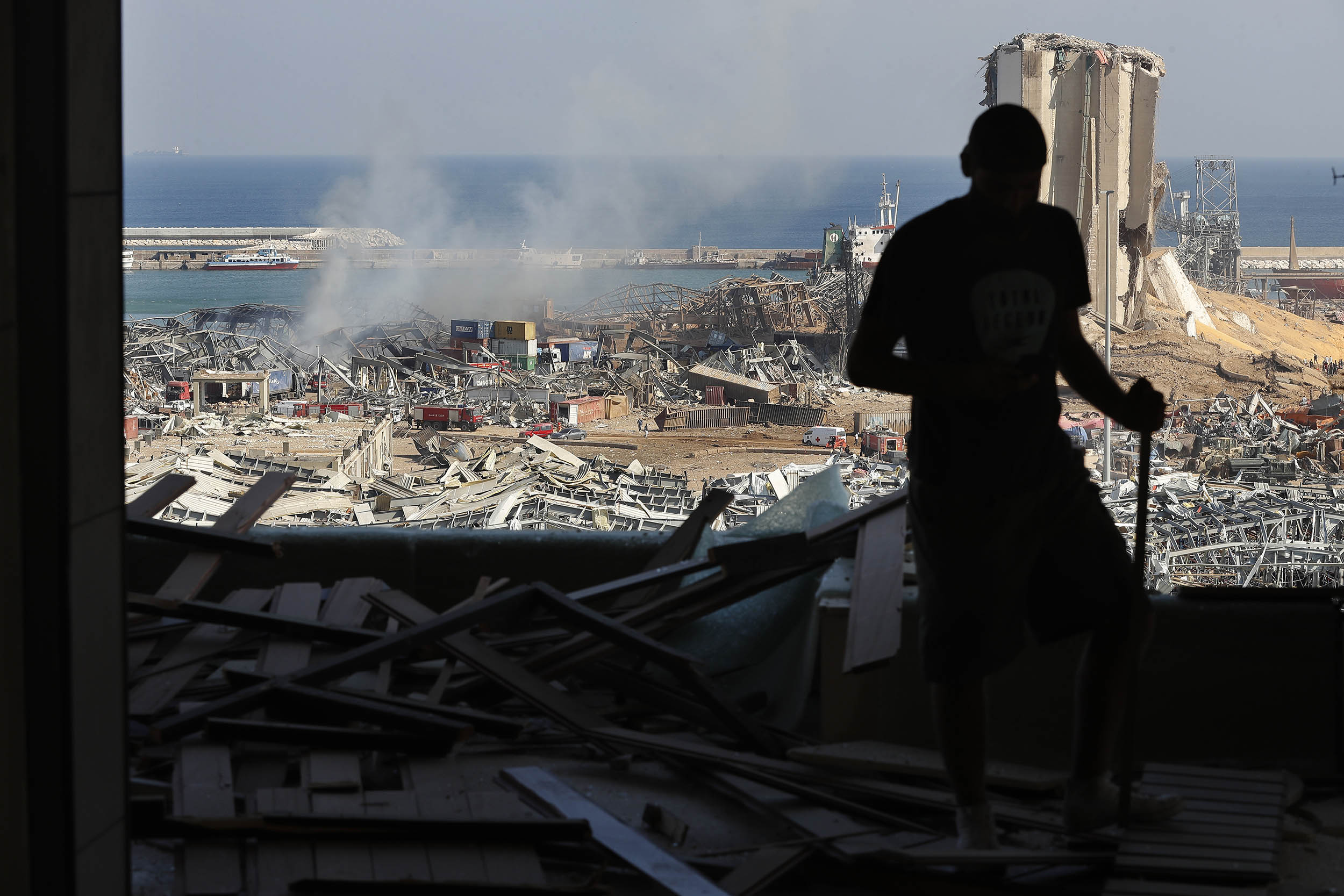
Hundreds of people in Beirut have been reported missing by family members in the aftermath of Tuesday’s blast, raising fears that the death toll will far exceed the current estimate of at least 100, Health Minister Hamad Hassan told reporters outside a damaged hospital Wednesday.
Hassan said his ministry was working on an emergency plan to set up field hospitals being sent from Qatar, Iran, Kuwait, Oman and Jordan. The minister said six to eight field hospitals would be ready “soon.”
Four of the city's hospitals were damaged by the explosion and are out of service, while those which remained open have been overwhelmed with casualties.
Correction: This post has been updated to correct a typo in Charbel Mallo's name.
Pope Francis prays for Lebanon in the aftermath of Tuesday's blast
From CNN's Valentina DiDonato
Pope Francis has called on people to pray for Lebanon in the aftermath of Tuesday’s deadly explosion.
"Yesterday in Beirut, near the port, there were massive explosions causing dozens of deaths, wounding thousands and causing serious destruction," the Pope said in his weekly General Audience on Wednesday, from the library of the Apostolic Palace in Vatican City.
“Let us pray for the victims, for their families; and let us pray for Lebanon so that, through the dedication of all its social, political and religious elements, it might face this extremely tragic and painful moment and, with the help of the international community, overcome the grave crisis they are experiencing."
The Lebanese Red Cross set up temporary shelters in Beirut for 1,000 families, while a popular ride-sharing app is offering free trips to anyone willing to donate blood
From CNN’s Jomana Karadsheh in Istanbul and Nada AlTaher in Abu Dhabi
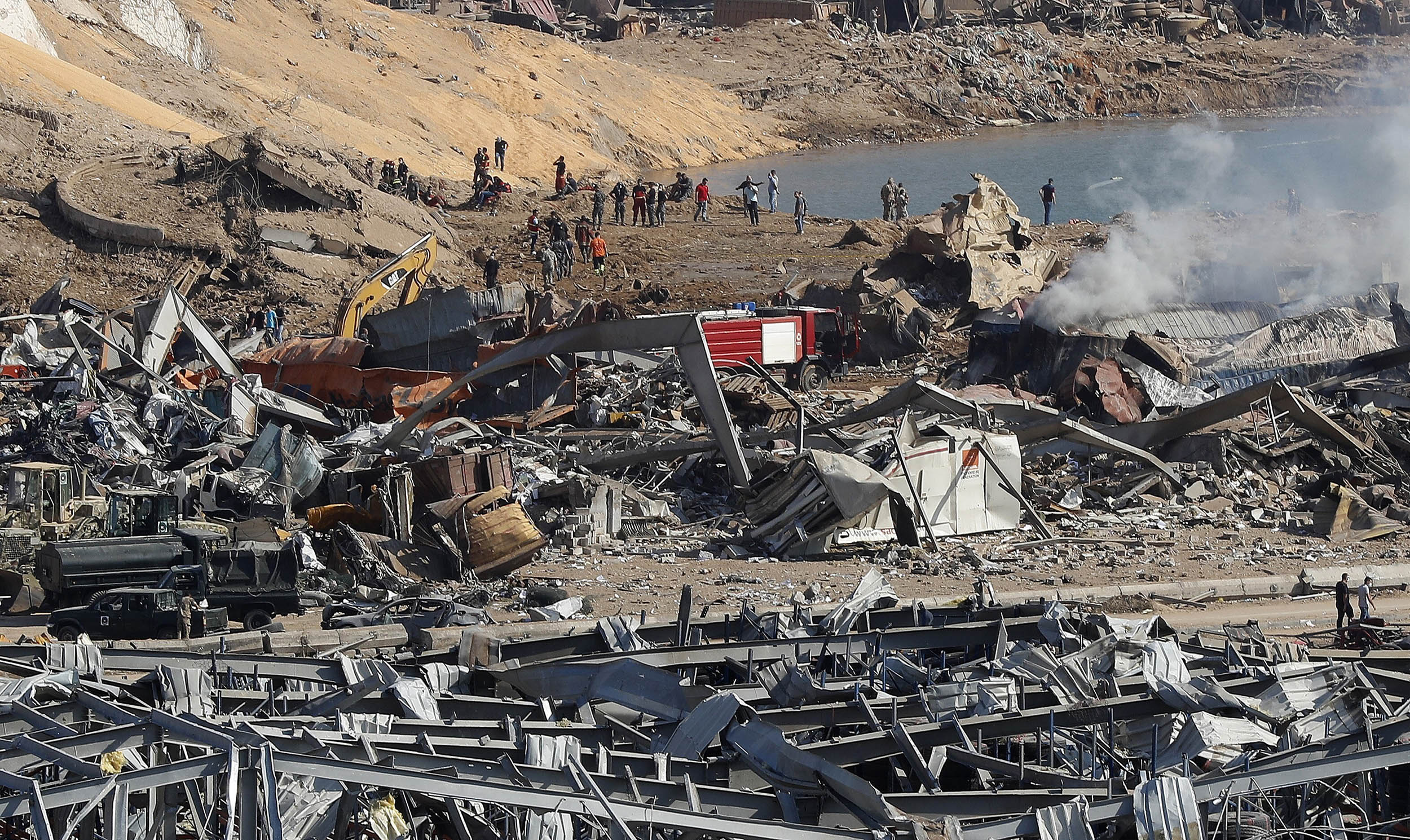
The Lebanese Red Cross said in a tweet on Wednesday that it is setting up enough temporary shelters with food, hygiene kits and basic needs to house up to 1,000 families for 72 hours.
Countless homes were destroyed after a blast tore through Beirut Tuesday evening.
At least one hundred people have died and more than 4,000 were wounded in Tuesday’s devastating explosion in the port of Beirut, state-run media reported citing the Red Cross.
Blood is in high demand, so ride-sharing app Careem is offering free rides for people traveling to and from donation centers and hospitals to donate blood. Careem is a subsidiary of Uber.
Tuesday's blast caused billions of dollars worth of damage, governor says
From CNN's Charbel Mallo in Abu Dhabi
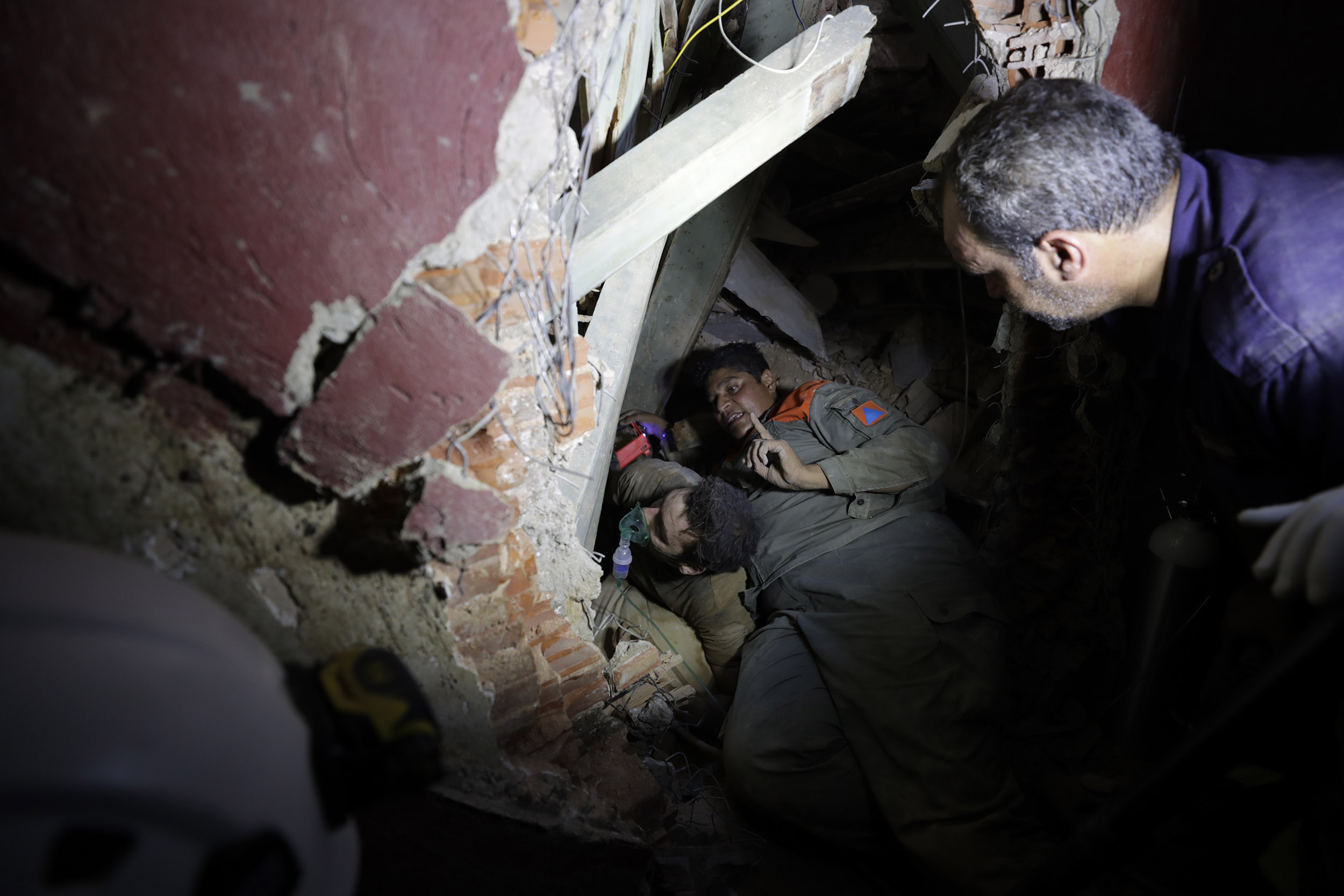
Tuesday’s explosion in the Lebanese capital has resulted in an estimated $3 billion to $5 billion worth of damage, Beirut governor Marwan Abboud told reporters Wednesday.
Lebanon is allocating 100 billion Lebanese pounds to deal with the blast's aftermath
From Ghazi Balkiz in Beirut and Nada Althaher in Abu Dhabi
Lebanon has allocated 100 billion Lebanese pounds – which according to the government rate is $66,335,000 -- to deal with the effects of the Beirut blast, the Lebanese Presidency Twitter account said Wednesday.
While the official rate stands at $1 to 1,500 Lebanese pounds, the rate available to average citizens is much higher due to inflation and the months-long economic depression.
According to Beirut residents and a widely used app that tracks the black market exchange rate, $1 would buy about 8,200 Lebanese pounds for average citizens at the time of the announcement.
The death toll from the Beirut blast is now 100, according to the Red Cross
From CNN's Ghazi Balkiz in Beirut, Lebanon
At least 100 people have died and more than 4,000 were wounded in Tuesday’s explosion in the port of Beirut, state-run media reported, citing the Red Cross.
Georges Kettaneh, the secretary-general of the Lebanese Red Cross, told Lebanon’s National News Agency Wednesday that the disaster is "unprecedented and very large."
Lebanese economist: Beirut is "completely destroyed"
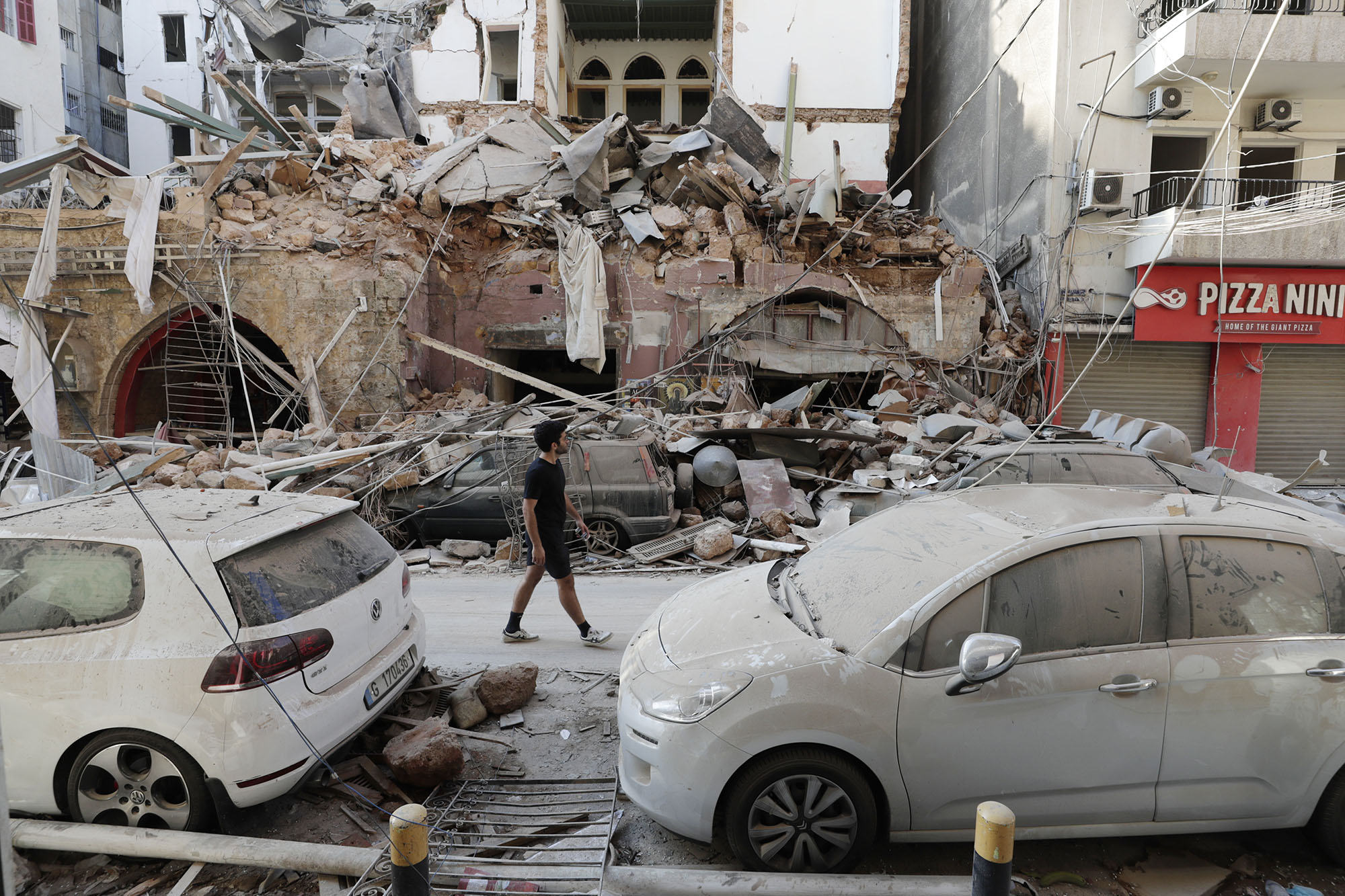
Jad Chaaban, an associate professor of economics at the American University of Beirut, said the situation on the ground in the Lebanese capital after the explosion is so dire that it is "beyond a national disaster,"
"Beirut city is completely destroyed and shattered," he said.
Chaaban said storing ammonium nitrate in a warehouse for years near a populated area amounted to "criminal" behavior.
Lebanon's Prime Minister, Hassan Diab, said that 2,750 metric tons of ammonium nitrate, a highly explosive material used in fertilizers and bombs, had been stored for six years at a port warehouse without safety measures, "endangering the safety of citizens," according to a statement.
The Prime Minister has launched an investigation into the explosion, saying he "will not rest until we find those responsible for what happened, hold them accountable, and impose maximum punishment."
More unrest coming: Chaaban told CNN he believes this incident could precipitate more protests in Lebanon.
"We are very, very angry at this political class, and they all should leave," Chaaban said.
Lebanon has been dealing with sporadic anti-government protests since late last year, when a popular uprising gripped the country. Many were angry with the country's ruling political class, endemic corruption and its dire economic outlook -- which has only gotten worse since Covid-19 hit. Prices for many goods have risen rapidly in recent weeks, some quadrupling, according to Chaaban.
"There is exasperation on the streets and there is a lot of anger," he said.
Russia is sending medical supplies and doctors to Lebanon
From CNN’s Mary Ilyushina in Moscow
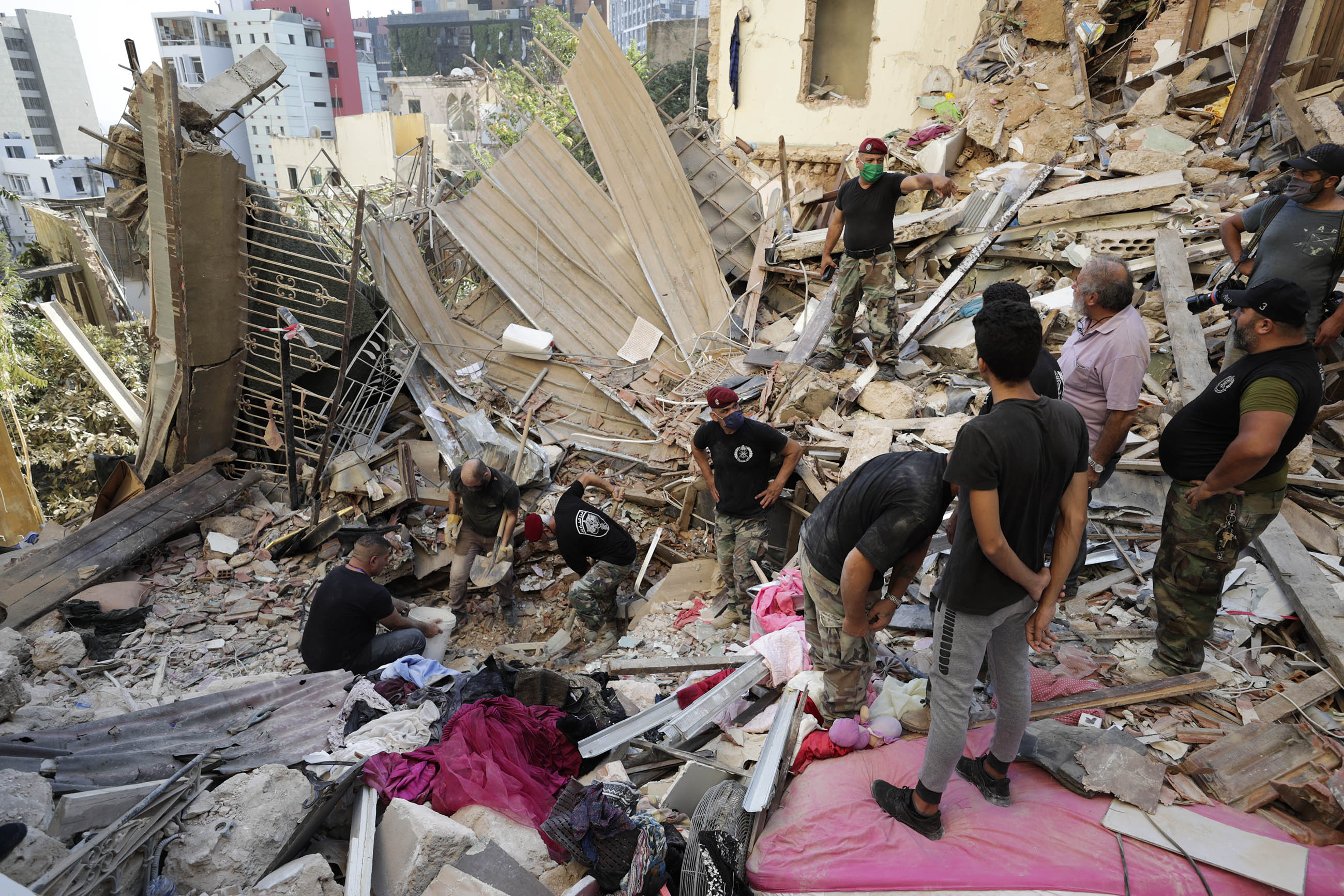
The Russian government is sending five planes of medical equipment and a team of doctors to set up a field hospital in Beirut to help the city in the aftermath of yesterday's explosion, the Russian Ministry of Emergency Situations said Wednesday, according to Russia's TASS news agency.
The ministry will also send a team trained for search and rescue operations and a mobile laboratory to identify cases of Covid-19.
Lebanon has recorded more than 5,000 cases of the virus, including 65 deaths, according to Johns Hopkins University.
2 Philippine citizens are among the dead
From CNN's Isaac Yee in Hong Kong
Two Philippine nationals were killed in Tuesday's explosion in Beirut, the Philippine Embassy in Beirut confirmed Wednesday.
Eight other Philippine citizens suffered injuries, the Embassy said in a statement. One is in critical but stable condition.
Two of the injured were part of a group of 13 Filipino seafarers whose ship was docked “some 400 meters away from blast zone," the embassy said. The other 11 from that group are missing.
The embassy said it is working with local authorities to locate and ensure the safety of those who have not been accounted for.
"The Philippines extends its deepest sympathies and condolences to the Lebanese Government and people, especially those who have been affected by this tragic event,” the Department of Foreign Affairs told CNN.
What we know so far about yesterday's explosion
From CNN's Jessie Yeung
A massive explosion rocked the Lebanese capital of Beirut on Tuesday evening, leaving dozens dead and thousands injured.
The blast has been linked to a large supply of confiscated and potentially unsecured explosive material, stored in a warehouse at the city's port, close to populated areas. As world leaders and international organizations step in to offer assistance, local officials are also launching an investigation into the blast.
As day breaks in Lebanon, authorities are scrambling to treat the wounded, search for survivors, and assess the full extent of the damage.
Here's what we know so far:
Journalist who lives near the port says the blast sounded like a "jet breaking the sound barrier"
Leila Molana-Allen, a journalist with France 24 in Beirut, lives about a kilometer away from Beirut's port.
She said the explosion caused a blinding white light and "ripped" the doors and windows out of her apartment.
"When I stood up, the entire apartment was covered in debris and glass," she said.
Watch her interview with CNN:
Ammonium nitrate stored in a warehouse is being linked to the explosion
From CNN's Helen Regan, Tamara Qiblawi, Ghazi Balkiz and Ben Wedeman
A warehouse storing thousands of tons of unsecured highly explosive material has emerged as a possible source of the massive blast that ripped through the Lebanese capital on Tuesday, killing at least 80 people, injuring 4,000 and sending a shock wave across the city that damaged buildings and blew out windows up to 10 kilometers (6 miles) away.
Lebanon's Prime Minister Hassan Diab said that 2,750 metric tons of ammonium nitrate, which is typically used as an agricultural fertilizer, had been stored for six years at a port warehouse without safety measures, "endangering the safety of citizens," according to a statement.
It's still not exactly clear what led to the ignition that wiped out entire streets across the seaside capital.
Initial reports in state media blamed the blast on a major fire at a firecrackers warehouse near the port, that likely spread to nearby buildings. However, the Prime Minister's account appeared to be backed by Lebanon's General Security chief Abbas Ibrahim, who said a "highly explosive material" had been confiscated years earlier and stored in the warehouse, just minutes' walk from Beirut's shopping and nightlife districts.
As Beirut's 4 million residents wake to the full horror and scale of the damage to their city, lives, and livelihoods, questions will be asked about why such large quantities of the dangerous chemical were allowed to be stored in the middle of the city without adequate safety measures, and who is responsible.
Read more:
One Indonesian citizen was hurt in the blast
From CNN's Jadyn Sham
An Indonesian national was "slightly injured" in Tuesday's explosion in the Port of Beirut, the country's Embassy in Lebanon said.
The embassy facility, which is located fewer than 10 kilometers (6 miles) from the port, was not damaged, said Basyiruddin Hidayat, an official with the Embassy of Indonesia in Beirut.
Hidayat said that according to the embassy's records, there are 1,447 Indonesian citizens in Lebanon, all of whom appear to be safe.
Beirut explosion death toll rises to 80
From CNN's Charbel Mallo in Abu Dhabi
At least 80 people have died and more than 4,000 were wounded after the massive explosion in central Beirut on Tuesday, Lebanon's Health Minister Hamad Hassan said Wednesday morning.
Hassan said four hospitals are out of service because of damage from the blast.
He said the death toll will likely increase.
"This is not just ammonium nitrate," former CIA operative says of explosion
Robert Baer, a former CIA operative with extensive experience in the Middle East, said videos of Tuesday's blast showed that while ammonium nitrate may have been present in the warehouse, he does not believe it was responsible for the massive explosion that ensued.
Initial reports blamed the blast on a major fire at a warehouse for firecrackers near the port, according to Lebanese state news agency NNA.
Lebanon's Prime Minister, Hassan Diab, later said that 2,750 metric tons of ammonium nitrate, a highly explosive material used in fertilizers and bombs, had been stored for six years at a port warehouse without safety measures, "endangering the safety of citizens," according to a statement.
Baer said he thinks that there were military munitions and propellants present. He speculated it could have been a weapons cache, but it's unclear who it belongs to.
"It was clearly a military explosive," he said. "It was not fertilizer like ammonium nitrate. I'm quite sure of that."
"You look at that orange ball (of fire), and it's clearly, like I said, a military explosive."
Baer noted that white powder seen in the videos of the incident before the major blast are likely an indicator that ammonium nitrate was present and burning. He also noticed a lot of munitions going off ahead of the larger explosion.
No evidence of an attack: Baer said while he believes the explosion does not look like solely ammonium nitrate, there's still no evidence that this was an attack. The government has blamed poor management and vowed to get to the bottom of it.
"It almost looks like an accident," he said. "It was incompetence, and maybe it was corruption, but the question is whether it was military explosives, who was it going to or why was it stored there?"
Baer isn't confident we'll ever know the truth.
"I've worked in Lebanon for years, and no one is going to want to admit they kept military explosives at the port. It's a stupid thing to do."
Investigation launched: Prime Minister Diab's account appeared to be backed by Lebanon's General Security chief Abbas Ibrahim, who said a "highly explosive material" had been confiscated years earlier and stored in the warehouse, just minutes' walk from Beirut's shopping and nightlife districts.
The Prime Minister has launched an investigation into the explosion, saying he "will not rest until we find those responsible for what happened, hold them accountable, and impose maximum punishment."
As yet, there is no clear evidence to suggest the source of the blast.
What is ammonium nitrate?
From CNN's Jessie Yeung
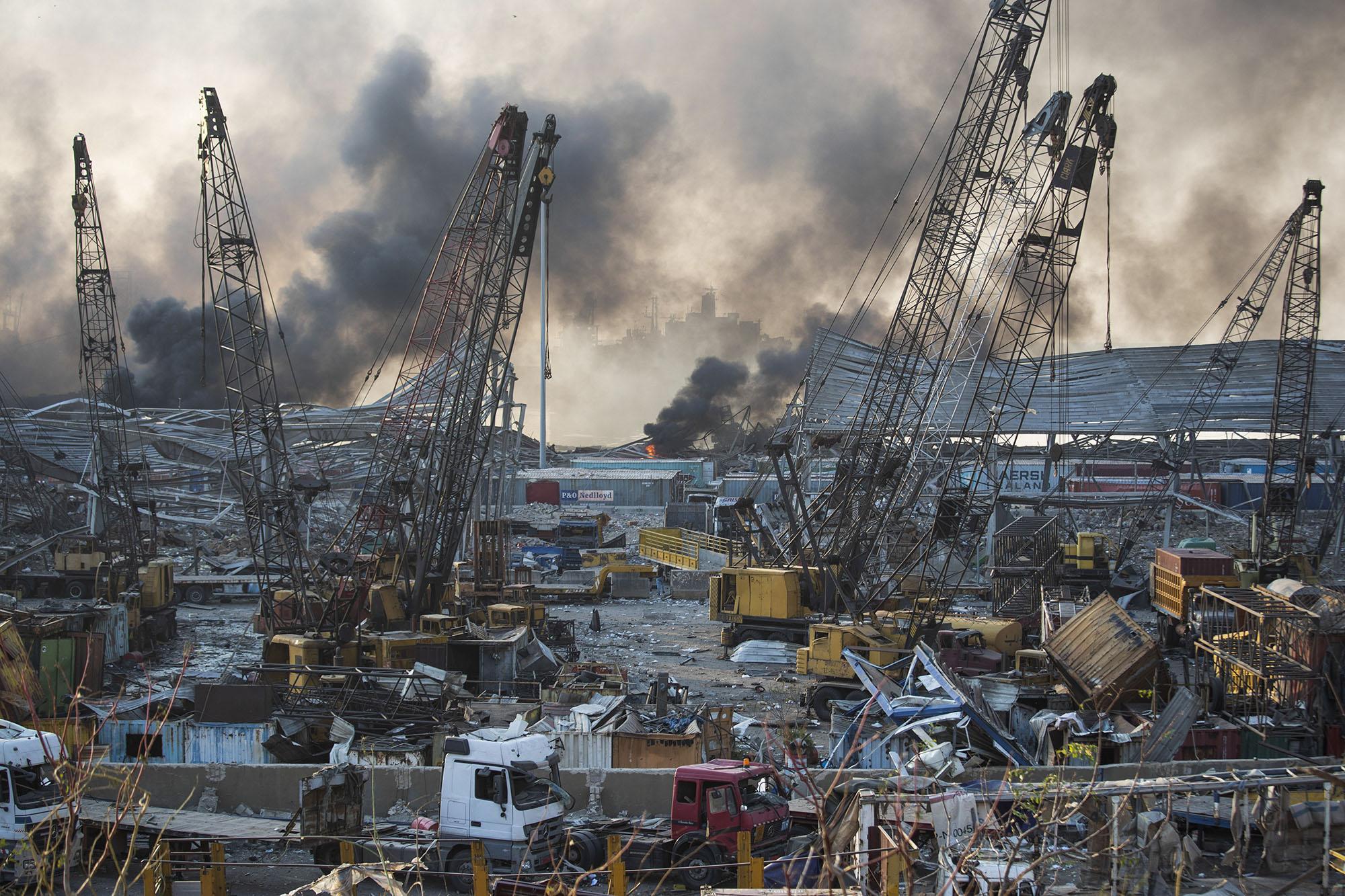
Authorities are still investigating what exactly caused Tuesday's deadly explosion in Beirut, but public statements from key Lebanese officials have begun to focus on ammonium nitrate that was kept in a warehouse near the port.
Lebanon's Prime Minister Hassan Diab said in a statement that an estimated 2,750 metric tons of the substance had been stored there for the past six years. Lebanon's general security chief said the "highly explosive material" had been confiscated several years ago.
Ammonium nitrate, a compound of ammonia and nitrogen, is best known for being used in fertilizers and -- because it's incredibly volatile -- bombs.
The bombing of the Alfred P. Murrah Federal Building in Oklahoma City in 1995, which killed 169 people and injured 467, was carried out using two US tons of ammonium nitrate.
One of the worst accidents in US history involving a form of ammonia occurred in April 1947, when a ship loaded with ammonium nitrate caught fire while docked in Texas City.
The blaze caused an explosion and additional fires that killed almost 400 people and damaged more than 1,000 buildings, according to the website of the Texas Historical Association. The explosion was triggered by 2,300 US tons of ammonium nitrate, according to US Homeland Security.
This man watched the chaos unfold in Beirut, as his wife stayed on the phone thousands of miles away
From CNN's Angus Watson in Sydney

Hairdresser Serge Mahdessian was working roughly 8,500 miles away from his wife, who was asleep in Melbourne, Australia when the explosion destroyed his salon in the Ashrafieh district of Beirut.
“It was so chaotic, it was like something out of a dream,” Mahdessian told CNN over the phone. "People running, holding their arms, their legs -- there was so much blood,” he said. “I could have died today, instead I was only hurt a little on my hands because I was quick to run inside.”
Phone footage taken by Mahdessian shows crumpled cars lining a street strewn with broken glass and rubble.
Awoken in the night: The call from his wife, Deanna Torus, came quickly -- she’d been woken in the middle of the night with news of the massive blast just a short distance north of where her husband was at work.
“I called Serge straight away and he was screaming over the phone, I was crying. He was extremely shaken up but was OK except for an injury on his arm and hands -- he flew to the bathroom to be safe," she said. “I was hit with anxiety. My body was shaking. I felt hopeless, like I couldn’t do anything.”
Separated for years: The young couple married last year after five and a half years together, but are used to being separated. Serge’s visa application, a process that has cost about $7,000 to date, has been rejected multiple times.
Covid-19 travel bans have piled on the misery.
“We’re mentally and physically exhausted. We’ve been together for five and a half years, refused visas and when I thought, what’s next? I never thought that it would be an explosion down the street from where my husband works,” Torus said.
Australia has a large community of Lebanese expatriates and people of Lebanese descent. The 2016 census determined that there are around 75,000 Australians with Lebanese heritage, mostly living in Melbourne and Sydney. The Australian government believes that there were 20,000 Australians in Lebanon before expats returned from around the world due to Covid-19.
The nightmare continues for Mahdessian, who says that the collapsed Lebanese economy, Covid-19 and an accident of this magnitude have made Beirut "unsafe."
Mahdessian said his aunt, a nurse, was receiving treatment for a broken shoulder and a head injury after a wall fell on her while working a shift in an Ashrafieh hospital.
He said they had to take her to another hospital because "no one was accepting people."
"The emergency room looked like a war had begun, the children -- their hands, their legs, I couldn’t believe what I was seeing," he said.
Latin American countries react to Beirut explosion
From CNN's Radina Gigova in Atlanta
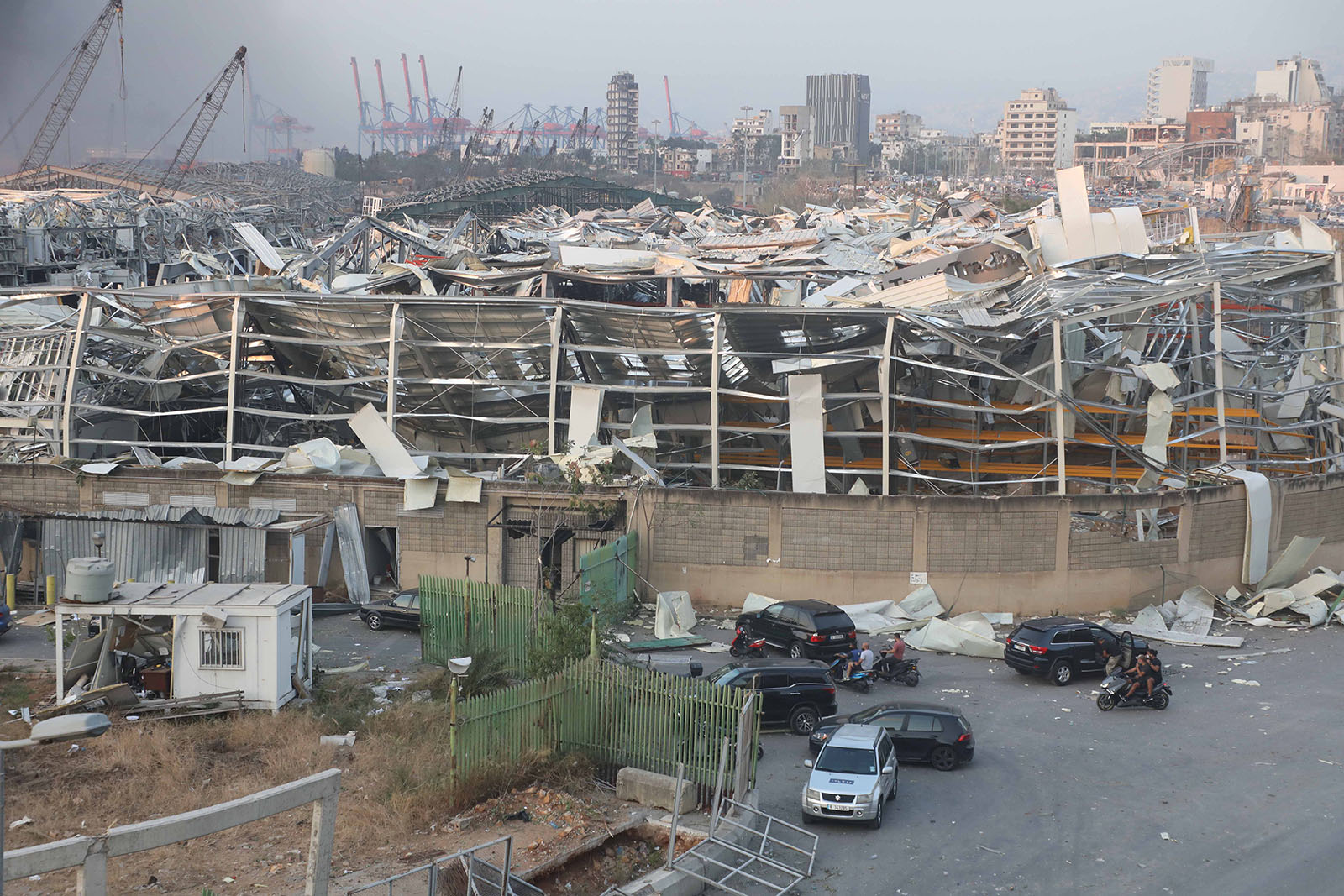
More countries in Latin America are sending their condolences to the Beirut explosion victims and relatives.
The region is home to a large diaspora of Lebanese expatriates and people of Lebanese descent.
Brazilian President Jair Bolsonaro said on his official Twitter account Tuesday evening that he is "deeply saddened by the scenes of the explosion in Beirut. Brazil is home to the largest community of Lebanese in the world and, therefore, we feel this tragedy as if it were in our territory. I express my solidarity with the families of the fatal victims and the wounded."
Mexico's President Andres Manuel Lopez Obrador said Tuesday evening on his official Twitter account: "Sad and unfortunate the situation in Beirut, Lebanon. Our condolences to the families of the victims and to the entire sister nation."
Panama's Foreign Ministry tweeted: "The National Government expresses its deep dismay at the terrible explosion that occurred in Beirut, while expressing its solidarity with the Republic and the People of Lebanon and expressing its condolences to the families of the deceased and injured."
And Ecuador's Foreign Ministry said: "Ecuador stands in solidarity with the Republic of Lebanon in light of the explosions registered in its capital, Beirut. @CancilleriaEc expresses its condolences to the families of the deceased." The ministry said 150 Ecuadorians reside in Lebanon and "so far there are no victims."
Explosives expert shares his thoughts on video from the scene
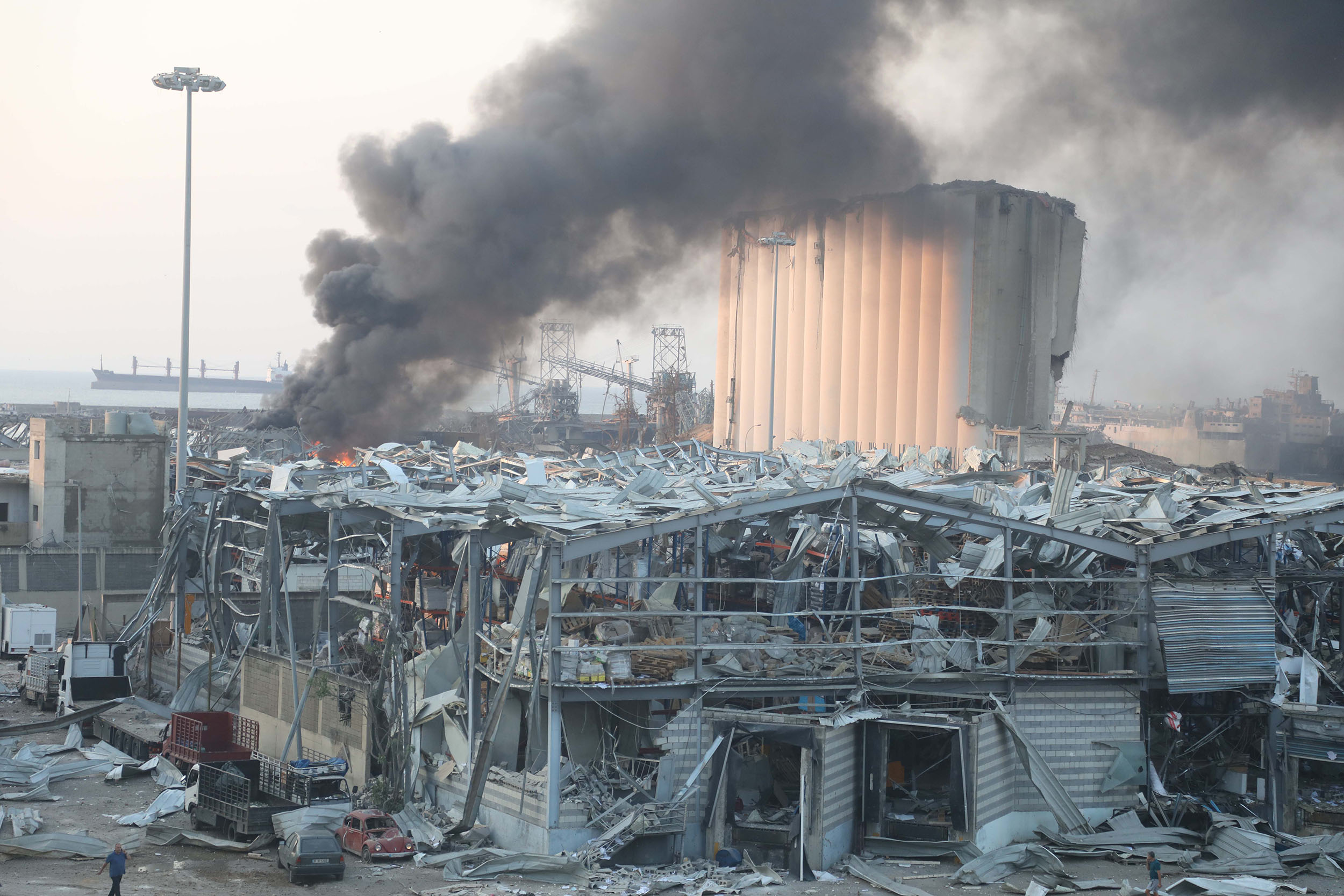
Tony May, a former explosives investigator for the US Department of Alcohol, Tobacco and Firearms, told CNN that video of the blast in Beirut offers important clues to what happened.
"I've done a lot of accident investigations with the government, both national and international, and it is clear to me that this was a large amount of explosives or energetic material stored in a building that caught fire and that fire propagated to the explosives, causing the accident," said May, who now works as a security and explosives consultant.
No yellow smoke: May said when he was in Baghdad, the telltale sign of an ammonium nitrate explosive was a yellow smoke cloud. The pink or red cloud that was seen, he said, was "not consistent with ammonium nitrate."
However, May said that doesn't necessarily mean ammonium nitrate wasn't involved. It could just mean there were "other items as well," he said.
White flashes: The white flashes seen in different parts of the video may indicate that smaller explosions were occurring in the lead-up to the large shockwave, May said.
What it was like in CNN's Beirut bureau when the blast hit
From CNN's Ben Wedeman in Beirut, Lebanon
It's an earthquake, I thought, as the CNN bureau in central Beirut shook Tuesday with a violence I'd never felt before. I crouched down on the floor, waiting for more tremors.
A split second later, I heard glass shatter and the crunch of metal. Peering through the window, I saw a cloud of yellow dust coming toward me, the street strewn with rubble and broken glass. People were running around and shouting, trying to understand what had happened.
I stumbled around the rest of the bureau. A window frame had been torn from the wall. The studio was a jumble of equipment, cables were scattered all over, but the tripod with its camera was still in place on the floor.
The bureau's glass entrance, with its big, red CNN logo, lay shattered in the corridor.
A few minutes later, a doorman named Mustafa, a lanky, normally good-spirited chap, came running in. "Are you ok?" he shouted. "Is everyone fine?"
"I'm fine," I responded. Nothing had happened to me.
Read more about Wedeman's experience here:
One Japanese national was injured in the Beirut blast. South Korea says its embassy sustained minor damage
From CNN's Yoko Wakatsuki in Tokyo and Jake Kwon in Seoul, South Korea
A Japanese citizen suffered a minor injury during the explosion in Beirut Tuesday, Japanese Chief Cabinet Secretary Yoshihide Suga said at a news conference on Wednesday.
Suga offered his condolences to the victims of the blast and said that the injured individual is believed to be the only Japanese casualty.
In South Korea: The country's Ministry of Foreign Affairs said in a statement that it has not received any reports of South Korean victims.
“Immediately after the incident, the South Korean Embassy in Lebanon checked on the well being of our citizens using local Korean group chat. There has been no report of casualties. The Embassy is cooperating with the government of Lebanon to take necessary measures to protect our citizens," the statement says.
The ministry said the South Korean Embassy in Beirut, which is about 10 km (6 miles) from the blast site, was not seriously affected by the explosion. Only two glass window panes from the fourth floor of the building were damaged.
Lebanese officials raise concerns with the US after Trump called the Beirut explosion an "attack"
From CNN's Kylie Atwood
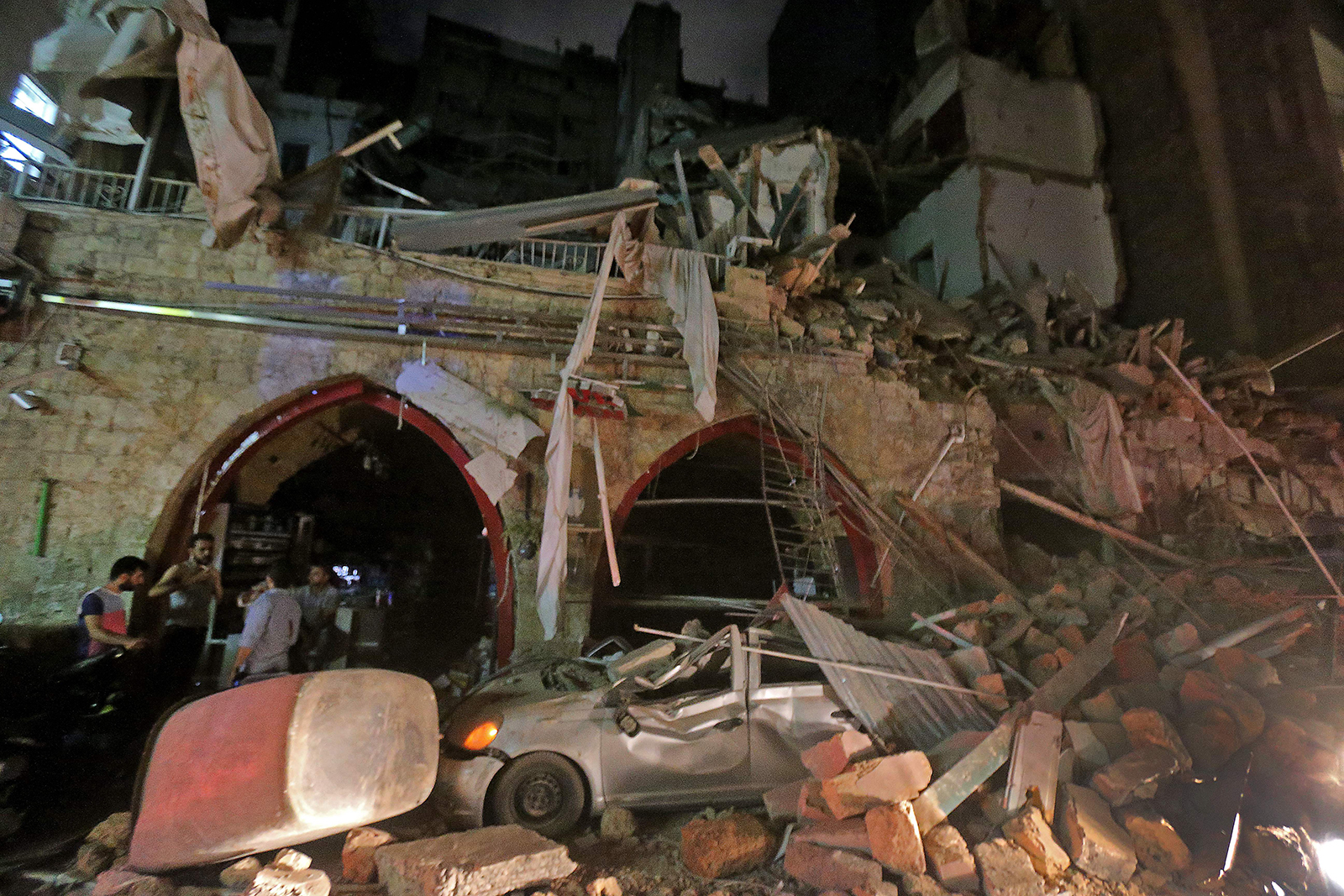
Lebanese officials raised concerns with US diplomats about using the word “attack” to describe the blast in Beirut Tuesday after President Donald Trump did so at a news conference, two US State Department officials said.
Trump offered sympathy and assistance to the people of Lebanon Tuesday after the explosions, which left dozens dead and thousands injured, referring to the incident as a “terrible attack.”
US Secretary of State Mike Pompeo said on Tuesday that the government of Lebanon is investigating the cause of the explosion and the US looks forward to that outcome.
What we know so far: Initial reports blamed the explosion on a major fire at a warehouse for firecrackers near the port, according to Lebanese state news agency NNA.
Lebanon's Prime Minister, Hassan Diab, later said that 2,750 tons of ammonium nitrate, a highly explosive material used in fertilizers and bombs, had been stored for six years at a port warehouse without safety measures, "endangering the safety of citizens," according to a statement.
The Prime Minister called the storage of the material "unacceptable" and called for an investigation into the cause of the blast, with the results released within five days, the statement said.
Lebanese officials have not called the explosion an attack.
Qatar, Iraq and Kuwait are all sending aid to Lebanon
From CNN's Ghazi Balkiz in Beirut, Lebanon
Qatar, Iraq and Kuwait plan to send medical assistance to Lebanon in the aftermath of the deadly explosion, according to state news agencies in the Middle East.
Lebanon's NNA news agency reported that Qatar will send supplies to outfit two 500-bed field hospitals on Wednesday. NNA also reported that Iraq will send a field hospital and oil.
The Emir of Qatar, Tamim Bin Hamad Al Thani, said on Twitter that he spoke on the phone with Lebanese President Michel Aoun "to express Qatar's standing with the brothers in Lebanon and its willingness to provide immediate support following the explosion."
"Our condolences go out to the Lebanese people, and we pray to God that the victims be blessed with mercy and heal the wounded," he said.
Kuwait’s Crown Prince Sheikh Nawaf Al-Ahmad Al-Jaber Al-Sabah has also directed authorities in the country to send urgent medical assistance to Lebanon, according to a statement by his court reported by Kuwait News Agency (KUNA).
Lebanon is in the middle of an economic crisis
From CNN's Tamara Qiblawi
The blast that rocked the Lebanese capital of Beirut hit the country at an already harrowing time.
Lebanon has been dealing with sporadic anti-government protests since late last year, when a popular uprising gripped the country. Many were angry with the country's ruling political class and endemic corruption. In October, protests erupted against a swath of new austerity measures -- including a proposed a tax on WhatsApp calls.
The ensuing unrest forced former Prime Minister Saad Hariri to resign, but did not solve the underlying issues.
Lebanon's economy, like many others around the world, was brought to a screeching halt by a government-imposed lockdown designed to stop the spread of Covid-19. Though Lebanon has only confirmed 5,062 cases of Covid-19 and 65 virus related deaths, according to data from Johns Hopkins University, pandemic-related restrictions have further exacerbated the country's deep and long-running financial crisis.
Lebanon defaulted on its debt for the first time, causing food prices to soar and the Lebanese lira to plummet.
Prior to the Covid-19 outbreak, the World Bank projected that 45% of people in Lebanon would be below the poverty line in 2020. Now, the government believes that up to 75% of people are in need of aid, Social Affairs Minister Ramzi Musharrafieh told CNN.
"We are hungry," came the resounding cries from angry protesters as they faced off with security forces during demonstrations that swept through Lebanon's major cities this spring.
Read more about the crisis in Tripoli, one of Lebanon's northern cities, in May:
It's just past 4 a.m. in Beirut. Here's what we know so far about the blast that rocked the city
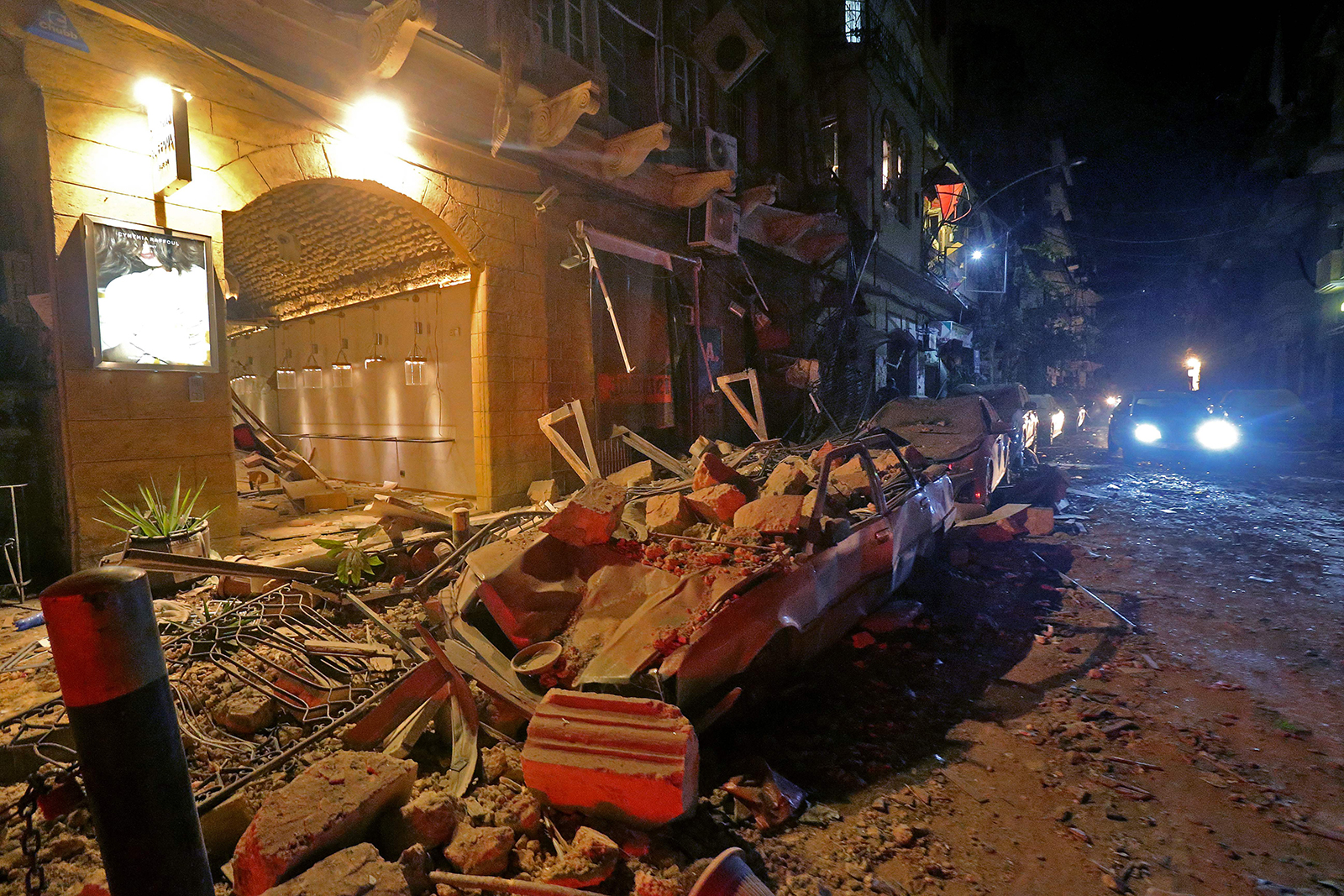
A large explosion rocked the Lebanese capital of Beirut on Tuesday at 6:07 p.m. after a major fire broke out near the city's port, killing at least 78 people and injuring 4,000.
What caused the blast: Initially, there were conflicting reports on what caused the explosion. It was earlier blamed on a major fire at a warehouse for firecrackers near the port.
Lebanon's Prime Minister Hassan Diab later said in a statement that an estimated 2,750 tons of ammonium nitrate, an explosive, had been stored at a warehouse for the past six years. Lebanon's general security chief said the substance had been confiscated years ago.
What's it like on the ground: In a word, apocalyptic. The blast tore through the city and wreaked havoc on nearly all of Beirut's quarters. The shockwave from the explosion was visible in footage of the incident.
Buildings as far away as 10 km (6 miles) from the site of the explosion were damaged. Streets were filled with shattered glass.
One witness told CNN the port was "totally destroyed."
Emergency wards were inundated with the injured, while the Lebanese Red Cross implored the public on Twitter for blood donations to help the wounded. One of Beirut's major hospitals, Hotel Dieu, received around 400 injured patients, an employee told CNN.
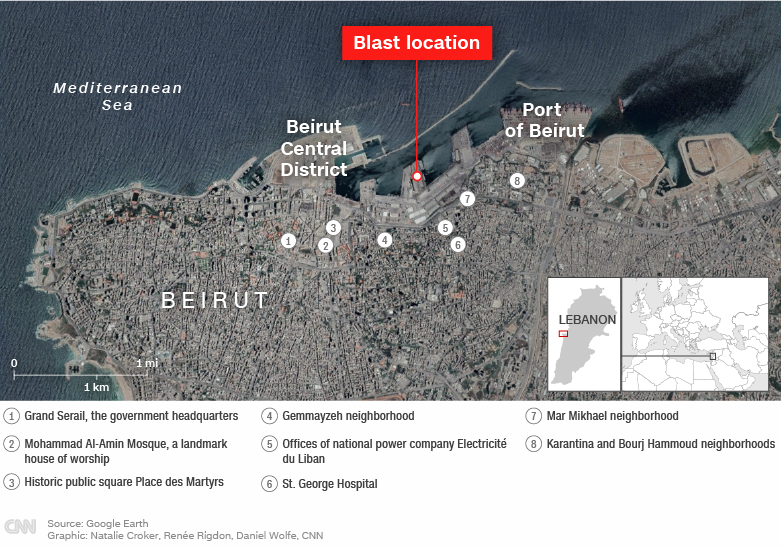
What's the government doing: Lebanese President Michel Aoun ordered military patrols in the city and vowed to investigate. Prime Minister Diab said the storage of ammonium nitrate at a warehouse was "unacceptable" and would be investigated.
"I will not rest until we find those responsible for what happened, hold them accountable, and impose maximum punishment," he said.
Thousands of tons of ammonium nitrate were stored at a Beirut warehouse for 6 years, Prime Minister says
From CNN's Raja Razek and Samantha Beech in Atlanta
Lebanese Prime Minister Hassan Diab said that an estimated 2,750 tons of ammonium nitrate had been stored at a warehouse in Beirut for six years, according to a statement published on the Republic of Lebanon Presidency website.
Ammonium nitrate is a key ingredient in both fertilizer and certain types of explosives. The substance has been used in terror attacks, including the bombing of the Alfred P. Murrah Federal Building in Oklahoma City in 1995.
It's still unclear what exactly caused the Tuesday explosion in Beirut that killed nearly 80 people. The blast was earlier blamed on a fire that broke out.
Lebanon's General Security Chief Abbas Ibrahim said earlier "highly explosive material" that had been confiscated years ago was being stored in the warehouse, which is just minutes' walk from popular shopping and nightlife districts.
Prime Minister Diab said in the statement it was "unacceptable" that so much explosive material was stored in a warehouse "without taking preventive measures while endangering the safety of citizens."
"I will not rest until we find those responsible for what happened, hold them accountable, and impose maximum punishment," he said.
Diab gave his condolences and wished for the speedy recovery of the wounded. He called for the formation of an investigation committee into the cause of the blast, which should release its results within a maximum of five days, added the statement.
US defense officials contradict Trump, say no indication of attack in Beirut
From CNN's Barbara Starr, Ryan Browne and Nikki Carvajal

Three US Defense Department officials tell CNN that as of Tuesday night there is no indication they have seen that the massive explosions that rocked the Lebanese capital of Beirut on Tuesday was an attack, as President Trump indicated during a question and answer session with reporters at the White House.
The officials, who declined to be identified so they could speak freely, said they don’t know what the President is talking about.
One official pointed out that if there were indications anyone in the region pulled something off of this scale, it would trigger automatic increases in force protection for US troops and assets in the region if for no other reason than worry about retribution attacks.
The official notes that none of that is happening so far at least.
Earlier Tuesday, Trump offered sympathy and assistance to the people of Lebanon after the explosions, which left dozens dead and thousands injured, referring to the incident as a “terrible attack.”
“Let me begin by sending America’s deepest sympathies to the people of Lebanon, where reports indicate that many, many people were killed, hundreds more were very badly wounded in a large explosion in Beirut,” Trump said at a press briefing Tuesday evening. “Our prayers go out to all the victims and their families. The United States ready to assist Lebanon.”
Trump said the country has a “very good relationship with the people of Lebanon and we will be there to help.”
“Looks like a terrible attack,” Trump said, appearing to look up from notes on his podium.
Asked if he was confident if the explosion was an attack and not an accident, the President said it “seems like” it was, based on what US military officials have told him.
“It would seem like it based on the explosion,” Trump said. “I’ve met with some of our great generals and they just seem to feel that it was not a – some kind of manufacturing explosion type of event. This was a – seems to be according to them, they would know better than I would, but they seem to think it was an attack. It was a bomb of some kind.”
There were conflicting reports on what caused the explosion, which was initially blamed on a major fire at a warehouse for firecrackers near the port. The director of the general security directorate later said the blast was caused by confiscated "high explosive materials," but did not provide further details.
Lebanese officials have not called the explosion an attack.
Prime minister offers condolences for Australian citizen killed in "horrific blast"
From Angus Watson in Sydney
Australian Prime Minister Scott Morrison expressed "deep regret" at the death of an Australian citizen who died in the "horrific blast" in Beirut.
Morrison appeared CNN affiliate Channel 7 Sunrise program on Wednesday and said that he received briefings about the blast but received no information on the cause.
All of the staff from the Australian Embassy in Beirut are accounted for and have sustained minor injuries like cuts and scratches, Morrison said on Channel 9's Today Show on Wednesday morning local. The building itself has been "impacted significantly," he said.
Morrison said that the image of the blast is "absolutely devastating" and acknowledged that there could be 20,000 Australians present at any one time in Beirut. He went on to say there are hundreds of thousands of Australians who have Lebanese descent.
"Our hearts really go out to our Lebanese Australian community. I know there’ll be many prayers in the Maronite churches and the mosques in Australia," Morrison told the Today Show broadcast on CNN affiliate Channel 9.
Morrison said it was not known how many Australians with Lebanese descent were in country as some may have returned due to the coronavirus outbreak.
At least 78 killed in Beirut blast, health minister says
From CNN’s Samantha Beech

The death toll from a massive explosion in the capital Beirut on Tuesday had reached 78, Lebanon's health minister has told the Reuters news agency.
Health Minister Hamad Hassan told Reuters that nearly 4,000 people have also been injured.
“There are many people missing until now. People are asking the emergency department about their loved ones and it is difficult to search at night because there is no electricity. We are facing a real catastrophe and need time to assess the extent of damages," Hassan told Reuters.
The minister earlier said in televised remarks that more than 70 people had been killed.
President Trump offers assistance to Lebanon: "We will be there to help"
From CNN's Nikki Carvajal

President Trump offered sympathy and assistance to the people of Lebanon after an explosion that left dozens dead and thousands injured on Tuesday, referring to the incident as a “terrible attack.” Lebanese officials have not called the explosion an attack.
“Let me begin by sending America’s deepest sympathies to the people of Lebanon, where reports indicate that many, many people were killed, hundreds more were very badly wounded in a large explosion in Beirut,” Trump said at a press briefing Tuesday evening. ”Our prayers go out to all the victims and their families. The United States ready to assist Lebanon.”
Trump said the country has a “very good relationship with the people of Lebanon and we will be there to help.”
“Looks like a terrible attack,” Trump said, appearing to look up from notes on his podium.
There were conflicting reports on what caused the explosion, which was initially blamed on a major fire at a warehouse for firecrackers near the port. The director of the general security directorate later said the blast was caused by confiscated "high explosive materials," but did not provide further details.
Asked if he was confident if the explosion was an attack and not an accident, the President said it “seems like” it was, based on what US military officials have told him.
“It would seem like it based on the explosion,” Trump said. “I’ve met with some of our great generals and they just seem to feel that it was not a – some kind of manufacturing explosion type of event. This was a – seems to be according to them, they would know better than I would, but they seem to think it was an attack. It was a bomb of some kind.”








